














































Welcome to the Worcestershire Care Services Directory 2022/23 which provides information on a range of social care services available across the county.
Our aim is for people to be well and stay safe, live independent and connected lives and to access the best support possible for those who require it under the Care Act. This Directory is for everyone, to help people to make the right decisions for the future independently and at the right time. The Directory is complemented by other information sources, such as the Worcestershire County Council website.
Visit www.worcestershire.gov.uk/info/20500/ adult_social_care
We are committed to working with social care providers to raise standards and maximise the quality and choice of services available in Worcestershire. We work closely with providers to ensure that people’s needs are met and liaise with inspectors to ensure that care providers meet appropriate standards.
This Directory has been compiled to support you to make an informed choice about the care you may need. As your local authority, we have a responsibility to assess you to enable those needs to be identified and to promote your independence and wellbeing. If you would like to access that advice, please contact the Adult Contact Team on 01905 768053.
This Directory contains information about the care and support services available to help you choose that care, whether you remain at home, move into a housing scheme that provides some care or consider moving to a care home or care home with nursing.
We wish to help people make the right decisions for their care needs and to promote independent living as much as we can.
I hope you will find this Directory useful, and if you require any further information about the many services available in the county, please do not hesitate to contact us through our Adult Contact Team on 01905 768053
Mark Fitton Strategic Director for People
Worcestershire County Council
Tel: 01905 768053
Email: adultteam@worcestershire.gov.uk
Web: www.worcestershire.gov.uk/info/20500/ adult_social_care
Your first step to accessing services is to have a conversation with Adult Social Care to discuss your specific needs, what options are available to you within the community and what you might consider if these don’t fully meet those needs. The Care Act calls this a ‘needs assessment’ and it’s free, irrespective of your income, and available to all those who appear to have care and support needs. More details are provided on page 7.
We’ve been working to make this process more open and proportionate to your needs but are always glad for feedback to improve our conversations further. The information you provide will help us determine whether you are eligible
for financial support via a Personal Budget, which allows you to buy in your own support and take control of your situation.
Depending on your level of income or savings, you may be expected to pay some or all of the costs towards your care and we can advise on this through a financial assessment. If you are expected to pay for the whole cost of your care (commonly called a ‘self-funder’), we can still advise on the best options for your care in order to help you get the most for your money. This is discussed on page 24 for those paying for care at home and page 48 for those paying for residential care. You will find information on benefits you may be able to claim on page 49.
We also understand the importance of Assistive Technology to help maintain and improve people’s lives to allow them to remain living independently for as long as possible. You will find more information on Assistive Technology on page 13.
Support or care to help you remain living in your own home may be the option that best suits your circumstances. Things you can do to make life easier
Looking for care in your area? Want to know the quality rating of providers you’re considering? Care Choices, publisher of this Directory, has a website providing comprehensive details of care providers as well as essential information.
You can search by postcode, county or region for care homes, care homes with nursing and home care providers that meet your needs across the country.
Your search can be refined by the type of care you are looking for and the results can be sent to you by email. They can also be saved and emailed to others.
at home, what is available and how you can access it are explained on pages 11 and 12. A list of local home care providers begins on page 27.
Useful checklists featuring questions to ask providers are also included in this edition. The Assistive Technology checklist is on page 14, the home care agency checklist is on page 23, another addressing care homes is on page 45, while one covering residential dementia care is on page 47.
Comprehensive lists of care homes and care homes with nursing in Worcestershire start on page 57.

We also have some information and advice about care decisions, making a comment or complaint about a service and how solicitors can help you, starting on page 53.
All this information and more is also available through the Worcestershire County Council website. Visit www.worcestershire.gov.uk/ info/20500/adult_social_care or contact the Adult Contact Team on 01905 768053
You can also view an electronic version of this Directory on the site and have it read to you by using the ‘Recite Me’ function. Visit www.carechoices.co.uk
Worcestershire County Council does not in any way recommend or endorse any of the organisations listed in this Directory, other than services we deliver directly. The information in this Directory relating to other providers of goods and services is for general information purposes only and does not purport to provide recommendations or make any offer and does not guarantee the quality of the goods/services. Other providers of goods or services are available.
The website includes detailed information for each care provider, including the address, phone number and the service’s latest CQC inspection report and rating (see page 54), indicating the quality of care provided.
Worcestershire Care Association (WCA) is pleased to be associated with this publication produced by Care Choices. We hope you find this Directory useful in your search for appropriate care in Worcestershire.
We are a not-for-profit organisation which represents the care industry in Worcestershire. Although we are part of the West Midlands Care Association family, the Worcestershire Care Association can trace its routes back to 1986 as the Hereford and Worcester Association of Care Home Proprietors. The Association merged with the West Midlands Care Association in 2005.
At WCA, we pride ourselves on offering the crucial support care providers require to deliver sustainable excellence within the community. We have a close working partnership with NHS Herefordshire and Worcestershire, Worcestershire County Council and Skills for Care.
The strength of the Association lies in its membership, drawn from across the county, embracing learning disability, mental health, nursing care, supported living, dementia, residential
Whether you are looking for advice and help for yourself, for a loved one or for another, the first step is to contact Here2Help to discuss your needs. We will
Here2Help is a service that can establish a route of early advice, information and signposting for people of all ages and is available for both residents and organisations to access local support. This might include support for many areas of health and wellbeing (included but not limited to):
• Maintaining independence.
care and physical disability. Membership continues to grow and represents a significant proportion of the care sector in each area. Members work together to help each other and share best practice, talking to the local authorities as a group to ensure their voice is heard.
We also run conferences for care and support providers to help them to share best practice and learn from one another, with an aim to improve the quality of care across Worcestershire and the West Midlands.
WCA works closely with other Associations around the country and nationally and draws upon the large network and resources available from our parent organisation the West Midlands Care Association. This enables us to spread the local message to the Government and national organisations. It also helps us to gather best practice and learning from around the country.
Globe House, Park Lane, Halesowen B63 2RA
Tel: 01384 637116
Email: enquiries@worcs.care
Web: www.worcs.care
learn what’s important to you and, by talking together, we can identify the support that best suits your needs, whether this is freely available or has a cost.
• Looking after someone.
• Healthy lifestyles.
• Money matters.
• Mental wellbeing.
• Recreation activities.
• COVID-19 assistance.
Request help from Help2Help by scanning the following QR code and filling in an easy and accessible online form which will then be addressed by one of our advisors.
Contact a member of our friendly team directly for support, signposting or assistance. The dedicated number is 01905 768053, option three. The Here2Help opening hours are Monday to Thursday, 9.00am to 5.00pm; and Friday, 9.00am to 4.30pm.
Scan the following QR code or visit www.worcestershire.gov.uk/ here2help to search the Here2Help Community Services Directory to return results on local community groups, services and organisations to support you.


You may require more in-depth support or intervention but contacting Help2Help first will enable you to have a conversation about your needs Our advisers can inform you of the pathways available to you. This might include (but is not limited to)
If you appear to have care or support needs, you have a legal right to an assessment of your care needs and finances. Councils are statutorily obliged to support you in this, regardless of whether you access their services. The assessment (which is free) will consider:
• What your main needs are.
• What strengths and resources you are able to draw on.
• What options are already available to you to support these needs.
• How you can best be supported to live as independently as possible.
• Your home and how you are coping in it.
• Your emotional wellbeing.
• Your diet.
• Any health and medical treatments you need.
signposting, information and guidance or support in the community, support from volunteers or, where appropriate, social care services.
This approach is intended to be both proportionate and personal to you and your individual circumstances. This way of working together also ensures you have control over the decisions discussed.
You may only need support for a short while or, perhaps, something longer term. We can provide support in both situations but will never make long-term plans for someone who is in crisis. It’s always better to address that need first before considering where we go from there. If you do need long-term support, we will complete an assessment will determine whether, and how much, you would be asked to pay towards the costs of your care.
If you are assessed as needing to pay the full costs of your care, you can make arrangements for yourself but, as a result of your conversations with us, you will have a much better idea of the range of options available to you and what to look for when purchasing services.

You can contact Worcestershire County Council for information and advice by calling the Here2Help Team. If you find this difficult you can ask a friend, relative or your doctor to do this on your behalf.
Tel: 01905 768053
Email: adultteam@worcestershire.gov.uk
Web: www.worcestershire.gov.uk/info/20500/ adult_social_care
If you are eligible for support from Worcestershire County Council, you may be offered a Personal Budget.
A Personal Budget is the amount of money allocated to eligible people to help fund their care and support. The amount you may receive will depend on your eligible needs and the costs of meeting those needs. The money can be either a full or a partial contribution to such costs and should be spent in line with a costed support plan that has been agreed by both you and Worcestershire County Council.
You may also choose to pay for additional support on top of the budget with a ‘top-up’ payment, explained further on page 50. Any eventual contractual agreement for services is between you and your care provider, not Worcestershire County Council.
A Personal Budget may be taken by an eligible person:
• In the form of a Direct Payment paid into a Pre-Payment Account created by Worcestershire
If you have been admitted to hospital and you might need care on discharge, you may be referred to social workers, a member of the Onward Care Team who supports with transfers from acute hospitals to home or have your care delivered elsewhere. This referral is completed by the ward staff. Ward staff or the Onward Care Team should also work with you to restart any services that were in place prior to admission, should they still be required.
If you can return home but require support, this will be provided in your home while assessment conversations are completed. During this time, discussions surrounding any contribution you may have to make for any ongoing services will take place.
If returning home from hospital is not possible, you may be offered bedded care in a Discharge to Assess setting.
County Council, held directly by you or, where you lack capacity, by a ‘suitable person’.
• By way of an account held and managed by an organisation in line with your wishes, or as an account placed with a third party (provider) and accessed by you in direct negotiation with the provider.
• Into a bank account specifically opened for the Direct Payment user and to be used solely for those purposes.
Everyone is financially assessed prior to the allocation of a Direct Payment and as with all services, you may have to contribute. Your client contribution will make up the first part of the Direct Payment budget and will pay for services in the first instance. Your client contribution must be paid into the Direct Payment account to ensure the correct amount is available.
Personal Budgets cannot currently be used to pay for residential care. Information on paying for care can be found on page 24 if you are receiving home care and page 48 if you are moving into a care home.
This is to allow people who need assessments of their longer-term care needs to have an opportunity to further recover and have these assessments completed outside of a busy hospital setting. These are usually for up to four weeks.
You will be allocated a social worker who will talk with you and your representative to assess your needs and discuss your options. You may also be considered for NHS Continuing Healthcare.
If it is felt that NHS Continuing Healthcare is appropriate for you, there will be no charge to you whilst you are under the scheme. Once an assessment of your long-term care needs has been completed, you may be removed from this scheme.
There will be further discussions with a social worker if you do require services and a financial assessment will be completed to clarify what contribution you might need to pay for ongoing care and support.
If you are in a community hospital and unable to be supported to return home, the ward will refer you to a social worker who will speak to you about assessments. The social worker can explain NHS
Reablement (sometimes called rehabilitation) is an intensive short-term service that helps people regain skills and confidence, for example, after a fall or hospital stay. You will need to have an assessment of your care needs to decide if you are eligible for reablement. If you are eligible, a reablement worker will support you for a limited period.
Reablement usually helps people to learn or re-learn daily living skills. Reablement is not about doing things for you, it’s about giving you the skills and confidence to do things for yourself.
Intermediate care aims to give recovery and rehabilitation support to help older people regain their independence when they come out of hospital or, just as importantly, prevent them from going unnecessarily into hospital.
Intermediate care can be provided in your own home or in a care home, depending on local policy
NHS Continuing Healthcare is a package of care that is arranged and funded solely by the NHS. This is free of charge, wherever it is delivered. NHS Continuing Healthcare support may be provided in
A personal health budget is an amount of money allocated to support someone who is in receipt of NHS Continuing Healthcare to purchase care to meet their needs. The aim is to enable people with long-term conditions and disabilities to have greater choice, flexibility and control over the healthcare and support they receive.
Continuing Healthcare and any financial assessments required to confirm the contributions you may need to make towards your care. See below for more information about NHS Continuing Healthcare.
The NHS website can be a good source of general information on these subjects, visit www.nhs.uk
It can also mean that you do not start to depend on support that could cost you money.

For example, a reablement worker could help you regain your confidence following a fall or provide support that enables you to prepare a meal if there has been a change in circumstances that means you need to cook.
Through reablement, pieces of equipment may also be identified that could support you to regain or maintain your independence for a long as you can.
and your specific needs. It can be provided by care staff, occupational therapy and physiotherapy, with additional support provided by the local GP surgery, social workers and community nurses. This combined resource helps people to regain their independence and feel confident in their ability to manage for themselves with any necessary additional support.
a nursing or residential care home or in a person’s own home. There are national eligibility criteria for NHS Continuing Healthcare and eligible people will have been assessed to have a ‘primary health need’.
‘Care and support’ is the term used to describe the help that some people with illness or disability need to promote their wellbeing, so that they can live a life that is as fulfilled and independent as possible.
Care and support can include help with normal day-to-day activities like washing, dressing, getting to work, eating and being part of your community. It might also include emotional support at a time of difficulty.
People who live with a long-term health or physical condition can experience difficulty in getting around their home and completing everyday tasks independently and safely.

You may be starting to think that your home might not be suitable for you anymore, in which case, adapting your home or moving to a readily adapted home could be for you.
You can speak to an occupational therapist who may be able to help you. They may suggest:
• A stair lift.
• Access ramps.
• Grab rails around the home.
You may want to consider significant building works to change the layout of your property, including:
• Widening doorways to fit a wheelchair.
• Replacing your bath or shower unit with a level-access shower.
• Adding a downstairs toilet, bathroom or bedroom so that you don’t have to keep using the stairs.
• Installing low-level kitchen units.
To make these changes, you will need advice from qualified builders on what to do.
Care and support can also include the help given by family and friends, Worcestershire County Council and other organisations, and help that people may buy themselves. If you are caring for a family member or friend, you may need support to do so.
Any decisions about care and support must involve you, taking into account your wellbeing and what is important for you and your family so that you can stay well and independent for as long as possible.
Some homes have already been adapted. You can look in your local paper if you wish to buy a suitable house, bungalow or flat. These are normally in special developments.
If you want to rent a home, you can contact your local housing association who will help you find a more suitable property. See page 36 for more on accommodation options.
If you’re having difficulties with everyday tasks at home, these simple solutions could make life easier and keep you independent. These are a starting point; other solutions are available which might better suit your needs.
Finding it difficult to get in and out of chairs? Try putting a piece of hard board under the seat base. Alternatively, buy chair raisers, a higher chair or an electric riser chair. Also try taking regular gentle exercise to improve your mobility.

If you can’t reach your windows, could you move furniture out of the way? Ask someone to help if you need to move heavy furniture. There are also tools for opening and closing windows.
Struggling to keep warm/cool? Consider a fan or heater. Is your house insulated? Are there any draughts? You may also be eligible for the winter fuel payment from the Government. Visit www.gov.uk/winter-fuel-payment
If you have trouble using light switches, think about replacing your switches for ones that are easier to use. Consider handi-plugs or light switch toggles, or there’s even technology available so that you can turn your lights on and off using your speech.

Use subtitles if you can’t hear the TV or buy wireless headphones. Do you need a hearing aid? Request an assessment from your council.
Do you forget to take your tablets? Try making a note of when you’ve taken them, or buy an automatic pill dispenser or pill box. If you struggle to open your medicine, you can ask your pharmacist for advice on alternative packaging that could make it easier for you.
Can you reach everything in your cupboards? If not, try a handi-reacher or rearrange your kitchen so the things you use most are within easy reach.
If you are having problems with preparing food, consider buying ready-chopped options or try a chopping board with spikes. There are also longhandled pans, teapot tippers and lid grippers that could help. Palm-held vegetable peelers or a food processor might be a solution and meal delivery services are also available.


Is eating and drinking becoming difficult? Large-handled cutlery could help, or non-slip mats for the table. Lightweight cups and mugs with two handles could also be a solution.
Using taps can be made easier by fitting tap turners. You could also consider changing to leverstyle taps which might be easier for you to use.

More information on staying independent and ideas to help you live at home can be found online at www.carechoices.co.uk/staying-independent-at-home/ There is also information on making larger adaptations to your home.
If moving whilst in bed is a problem, have you thought about using an over-bed pole? You might also want to buy a pillow raiser or change your bedding so it’s lighter.
Is it becoming difficult to get dressed? If so, specially adapted clothing is available, or you could buy a long-handled shoe horn, a dressing stick or a button hook. If you are having a lot of difficulty, consider home support, see page 19.
Clocks are available with large numbers or lights if you can’t read the time in bed. You can also buy clocks that speak the time.
If you are finding it harder to read in bed, consider an e-reader that allows you to change the font size. Some also have integrated lights. Look for bedside lamps with a step-on or button switch if yours are difficult to use.
Do you struggle to get in and out of bed? You could learn new ways of moving around, purchase a leg lifter or a hoist or install grab rails for support. Seek advice about these options. If the bed is the issue, you could buy an electric adjustable bed or raise the bed to the right height.

If it’s hard to hold your toothbrush, try a toothbrush gripper. You might also benefit from having an electric toothbrush or sitting on a stool while brushing your teeth.

You might like to buy a raised toilet seat, or a seat with a built-in support frame if it’s hard to use your toilet. Flush lever extensions are also available.

Has it become more difficult to wash? Items are available, like long-handled sponges and flannel straps. You could also consider a slip-resistant bath mat, grab rails, a half step to help you get in and out of the bath or a bath or shower seat. Tap turners can also be used in the bathroom.
For more information on technology that could make your life easier, contact your council for an assessment. They might refer you to an occupational therapist (OT) or you could contact an OT privately. Search online for OTs near you.
Worcestershire County Council Tel: 01905 768053
Email: adultteam@worcestershire.gov.uk Web: wwww.worcestershire.gov.uk/ info/20500/adult_social_care
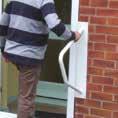

HIAs are local not-for-profit organisations funded and supported by local and central Government. They pride themselves on working professionally and sensitively with older and disabled homeowners, providing advice, support and assistance to help them repair, improve, maintain or adapt their home to meet their changing needs. Most HIAs provide three main services:
• Information and advice on repairs or adaptations you may be considering. This usually entails a visit to your home and is often free.
• A handyperson service for small jobs and repairs. Typically, the HIA will employ its own handypersons and charge you an hourly rate for their services.
There is a range of equipment available to make life easier and to improve safety and independence in the home, such as stair rails, raised toilet seats and shower stools.

Assistive Technology and Telecare refers to devices or systems that can support a person to maintain or improve their independence, safety and wellbeing. The technology not only aims to benefit the individual but can also help carers who may be required to support an individual.
Technology, once installed, can help to:
• Restore confidence for people who feel vulnerable in their own homes.
• Keep people independent, both in their home and supporting them out and about.
• Monitor health conditions.
• Detect falls.
• Remind people to take medication.
• Help warn of problems where people live, such as fire or flooding.
• Give carers peace of mind that their loved ones are safe in their absence.
• A home adaptations service for more major works. The HIA will work with you to specify the adaptations needed, and it will normally offer to get estimates from one or more of its regular contractors. Subject to your acceptance, the HIA will then offer to manage the works contract for you, for an agreed fee.
HIAs may also be helpful if you are not sure you can afford the home repairs or adaptations you need. They can advise on your eligibility for any grants and, if necessary, put you in touch with an independent financial adviser.
For further information and contact details for local HIAs, visit www.housingcare.org
These simple items are often referred to as ‘simple aids for daily living’. If you would like more information, you can discuss this with an occupational therapist or social worker.
Many of the technology suppliers will help people to choose the technology that will help them. The suppliers will also help to install the technology and remove it should it no longer be needed.
Assistive Technology can be purchased directly from suppliers such as Community Housing Technology Enabled Care Services (www.communityhousingtecs.co.uk ) or New Lifeline (www.redditchbc.gov.uk/living/ support-at-home/new-lifeline ). Other suppliers are also available.
To find out more, visit www.worcestershire.gov. uk/info/20500/adult_social_care or contact Worcestershire County Council on 01905 768053 to see if you are eligible for an assessment.
We suggest you consider the following questions before buying any Assistive Technology. If you are in any doubt about what technology might help meet your needs, you can contact your council or visit https://asksara.livingmadeeasy.org.uk
You can download and print this checklist at www.carechoices.co.uk/checklists
Does the equipment support your specific needs?
Are you willing to use it?
Will it fit into your everyday life and routine?
Have you tried a demo of the equipment?
Do you understand what the equipment is for?
Do you need to take it with you when you leave the house? Is it transportable?
Does the equipment have any limitations that would make it unsuitable for you?
Will it work alongside any Assistive Technology you already have?
Is a simpler piece of equipment available, e.g. a pill case rather than an automated pill dispenser?
Does the equipment need a plug socket, and will its wire cause a trip hazard?
Is it easy to use? Can you read/hear it clearly and are any buttons big enough for you?
Are you able to use it? Are there any aspects you don’t understand?
Will it need to be installed by a professional?
Can the retailer provide you with training in using the equipment?
Will it work if you have pets or live with other people, e.g. could someone else set off a sensor alarm by accident?
Have you read reviews of the particular piece of equipment you are looking at? Consider these before making your purchase.
Can you speak to someone who already uses it?
Does it require batteries? Find out how often they will need changing and whether the equipment will remind you to do this.
Is it durable? If you might drop it, is it likely to break?
Do you know how much it costs?
Will you need to pay a monthly charge?
Are there alternative solutions that might be free?
Is there a cost associated with servicing the equipment? Notes
Is it portable?
The Worcestershire Travel Wallet is an exciting scheme which supports people with various disabilities to make the best use of public transport. It aims to help people overcome some of the daily communication barriers that they may face.
Under this scheme, if you have a disability, you will be provided with a recognisable plastic wallet which will enable you to organise your tickets/ travel pass. It also enables you to display simple messages that you can show to drivers/ticket staff to assist in your journey.
Some of these messages will be simple requests for patience, such as ‘please wait for me to find a seat’
Do you provide any of the following unpaid support to a relative, partner or friend who is ill, frail, disabled or has mental ill-health or substance misuse problems?
• Emotional support.
• Medical care.
• Personal care.
• Physical care.
• Domestic tasks.
If you would like information and support regarding your own wellbeing, assessments you are entitled to or how your support needs can be met, contact the ‘Worcestershire Carers Hub’, provided by the Worcestershire Association of Carers (WAC).
Worcestershire County Council has a duty to provide information, advice and support and promote the wellbeing of carers. We do this via the Carers Hub which provides a single point of contact for all carers. The Carers Hub offers a range of support

and others might be more specific to your particular journey, such as ‘could you let me know when we get to the college’.
You can show these cards when seeking assistance with your journey, whether this is when boarding a bus, buying tickets, on a train platform or in other circumstances.
To request a wallet and a set of message cards, contact the Adult Contact Team.
Tel: 01905 768053
Email: adultteam@worcestershire.gov.uk
If you do, then you are a carer. There is support for you if you need it or just want someone to talk to. You are not on your own.
Tel: 0300 012 4272 (Monday to Friday, 9.00am to 7.00pm; and Saturday, 9.00am to 12.00pm). Web: www.carersworcs.org.uk/contact (you can also get in touch during opening hours via the web chat facility in the bottom right-hand corner of the website).
that may be required through your caring journey and beyond. Our aim is to empower and build resilience of carers to maintain the caring role where appropriate and help to manage the impact of the role on the carer’s life.
If further support is required, carers are also entitled to a carers’ assessment. This looks at the impact of caring on you because of your caring role and identifies any eligible needs you might have. It looks at how these needs can be met through a carers’ support plan.
The Carers Hub is provided by the Worcestershire Association of Carers (WAC). WAC supports carers no matter what your level of caregiving or support requirements are.
Support provided includes:
• Full range of information, advice and support (helpline, web chats, website, face-to-face, drop-in and group based).
Young carers can access support from Youth Support Services (YSS). Support includes signposting, one-to-one support and youth clubs for young people with a caring role.
Contact the Carers Hub for information, advice and support.
Tel: 0300 012 4272 (Monday to Friday, 9.00am to 7.00pm; and Saturday, 9.00am to 12.00pm). Web: www.carersworcs.org.uk/contact (you can also get in touch during opening hours via the web chat facility in the bottom right-hand corner of the website).
A parent carer forum working with local authorities, education, health and other providers to make sure the services they plan and deliver meet the needs of disabled children and families. For more information, visit www.carersworcs.org.uk/parent-carer-forum
Herefordshire and Worcestershire SENDIASS has a dedicated team of advisers offering legally based, easily accessible information and advice about
• Emergency, contingency and future planning.
• Training/information and wellbeing sessions.
• Peer support.
• Helping carers have their say about services.
• Telephone befriending and Carers Talk time.
• Employment, education, and volunteering opportunities.
• Engaging with the local community, awareness raising and partnership working.
The Carers Hub works with various services to support carers to identify the resources already available to them from their family, friends and community networks and put support in place to complement these where necessary.
YSS – Worcestershire Young Carers
Tel: 01905 619886 (Monday to Friday, 10.00am to 4.00pm). • Email: youngcarers@yss.org.uk Web: www.yss.org.uk
special educational needs and disabilities (SEND).
SENDIASS supports parents, carers, children and young people with SEND and its service is impartial and confidential. For more information, visit www.hwsendiass.co.uk
My Family, Our Needs is an online resource providing impartial information for parents, carers and practitioners supporting children from birth to 25 years with additional needs. As well as guidance, policy and signposting, there is a lifestyle section for parents covering topics such as health and wellbeing, work, family, and relationships. Visit www.myfamilyourneeds.co.uk
www.myfamilyourneeds.co.uk
For parents and carers of children with additional needs and those who support them.

We deliver excellent home care with compassion and a cheery smile!

When our Care Assistants come to visit, they bring with them knowledge and training with a personality that delivers compassion, smiles and laughter too!
They support you to remain safe at home whilst enabling you to live life to the fullest. Every care package we create is bespoke and designed with your needs and preferences in mind.
For more information on our range of services, contact us on the details below.
Delivering care and smiles at every visit.
Worcester & Malvern Hills 01905 452595
worcester@caremark.co.uk caremark.co.uk/worcester
Wychavon & Wyre Forest 01562 543290
wychavon@caremark.co.uk caremark.co.uk/wychavon
“ Caremark has truly transformed my life.
Carefully chosen home care, with a good-quality provider, is an excellent way to retain your freedom and independence, whilst getting the help you need to stay happy and safe. It can offer the opportunity to stay at home, in your own familiar surroundings, and to retain a quality of life you might have feared lost. Types of services that could be offered include:
• Personal care, such as help with getting dressed or washing.
• Help with eating, preparing and cooking food.
• Help with taking medication.
• Help around the home with tasks such as washing up and laundry.
Reasons for choosing home care can vary. Sometimes, after a stay in hospital, someone might find they need some help whilst they recuperate. Others can find that a long-term condition or disability means they need some assistance at home.
After a stay in hospital, someone may carry out an assessment of your situation to see if home care will benefit you. You and your family will be fully involved in looking at what will suit you best if you’d like them to be.
Alternatively, you or those close to you might notice changes in your ability to manage the day-to-day things you normally cope with easily, like preparing meals or looking after yourself. If this happens, contacting Adult Social Care is a good first step towards finding help.
The level of home care provided can be tailored to meet your needs – from a visit once a day to a much greater amount of support.
Even those with quite significant and debilitating medical conditions can get skilled personal care that can enable them to stay in their own home. Some agencies offer live-in care, where a care worker will stay with you at home to support you throughout the day and night.
For some people, it’s preferable and more economical to have a care worker actually living in their own home. This is called 24-hour live-in care and can provide care to people with very high care needs on a permanent basis. 24-hour live-in care can also provide respite breaks for regular carers and short-term support following hospital discharge.
Live-in care can be arranged for a short period, for example, a week, or on an ongoing basis. Typical charges for this service depend on the amount of care and the particular skills required. Live-in care is also available to people with permanent physical or mental health difficulties who require long-term ongoing care.
Looking for care in your area? Want to know the quality rating of providers you’re considering? Care Choices, publisher of this Directory, has a website providing comprehensive details of care providers as well as essential information.
You can search by postcode, county or region for care homes, care homes with nursing and home care providers that meet your needs across the country.
Your search can be refined by the type of care you are looking for and the results can be sent to you by email. They can also be saved and emailed to others.
The website includes detailed information for each care provider, including the address, phone number and the service’s latest CQC inspection report and rating (see page 54), indicating the quality of care provided.
You can also view an electronic version of this Directory on the site and have it read to you by using the ‘Recite Me’ function. Visit www.carechoices.co.uk
The Care Quality Commission (www.cqc.org.uk) is responsible for checking that any care provided meets essential standards of quality and safety. Further information is on page 54.



The Homecare Association requires its members to comply with a code of practice. This code includes a commitment to treat customers with dignity and respect and operate at a level above the legal minimum required in legislation.
Social care regulations do not apply to cleaners, handypersons or gardeners. However, some home care agencies are increasingly providing staff who can help meet these needs too.
The benefits of using a regulated agency include:
• Assessing your care needs and tailoring a plan to meet those needs.
Dementia is not a disease but a collection of symptoms that result from damage to the brain. These symptoms can be caused by a number of conditions. The most common type of dementia is Alzheimer’s disease.
Common symptoms of Alzheimer’s disease and other forms of dementia include:
• Memory loss, especially issues with recalling recent events, for example forgetting messages, routes or names, and asking questions repetitively.
• Increasing difficulties with tasks and activities that require organisation and planning.
• Becoming confused in unfamiliar environments.
• Difficulty finding the right words.
• Difficulty with numbers and/or handling money in shops.
• Changes in personality and mood.
• Depression.
More detailed information about the symptoms of dementia is available on the NHS website. Visit www.nhs.uk
How can I reduce my risk of dementia?
What’s good for your heart is good for your head. A healthy lifestyle can reduce your risk of developing dementia when you get older. It can also prevent cardiovascular diseases, such as stroke or heart attacks.
• Advertising, interviewing and screening
of workers.
• Arranging necessary insurance cover.
• Providing training and development for care workers.
• Managing workers’ pay, including compliance with the National Minimum Wage.
• Managing employment relationships, including sickness, absence and disciplinary matters.
• Managing health and safety issues.
For further help when speaking with home care agencies, use the checklist on page 23.
Find out what you can do to reduce your risk of dementia at www.nhs.uk/conditions/dementia/ dementia-prevention
Dementia is a confusing and scary disease, both for those who live with it and those who care about someone living with dementia. By becoming a Dementia Friend, you can understand more about dementia and learn that offering a little support can make a lot of difference. Visit www.dementiafriends.org.uk for more information.

Worcester Dementia Action Alliance is helping to raise awareness of what you can do to reduce your risk of dementia and how we can all help people living with dementia. You can get involved in your local area as a volunteer and help to create Dementia Friendly places and communities. Find out more at www.dementiaaction.org.uk/local_alliances /20687_worcester_dementia_action_alliance
In Worcestershire, we have dementia friendly towns, supermarkets and businesses.
Look out for the dementia friendly logo in your local community. It may be that your local supermarket has a slow lane with extra help in place for people living with dementia.










Agency 1
Agency 2
Agency 3
We suggest that you have paper with you when speaking with home care agencies so you can make notes. You can download and print this checklist at www.carechoices.co.uk/checklists
How long has the agency been operating?
How long are staff allocated per visit?
Can you contact the agency in an emergency or outside office hours?
Does the agency have experience with your specific needs?
Are you likely to be visited by different staff each day?
Are all staff checked with the Disclosure and Barring Service?
Will you be notified in advance if your care worker is on holiday or sick?
Are staff matched to you specifically, based on your needs and preferences?
Can you meet your care worker(s) before they start?
Does the agency have both male and female staff?
*See page 54.
Can the agency accommodate your needs if they increase? Ask about the process for this.
Does the agency have a training scheme in place?
Are all staff trained to a certain level?
Are staff able to help with administering medication if required?
Is there a way for staff to communicate with each other about the support they provide when they visit you? How?
Will your support plan be reviewed at regular intervals?
Can you see the agency’s contract terms?
Can you lodge a complaint easily?
Are complaints dealt with quickly?
Can you see a copy of the agency’s CQC registration certificate and quality rating?
Councils provide information on how much people can expect to pay towards their care and support and how charges are worked out. Until a full financial assessment is carried out, visit www.worcestershire.gov.uk and search ‘charges for care and support’.
Here, you will find an online financial assessment link. This indicates your possible contribution and submits your details to the Care Contribution Team to enable a full financial assessment to be completed once you have been assessed as having a care need by your social worker.
If you have more than £23,250 in savings or capital, you will have to pay the full cost of your care. The value of your home is not counted when working out charges for non-residential care. If you have more than £23,250, you should tell Adult Social Care when your savings are likely to fall below this amount. Worcestershire County Council calculates charges in accordance with national eligibility criteria set by the Government. This ensures people are only required to pay what they can afford, taking into account capital, savings, income and expenditure.
Your financial assessment looks at how much money you have, including your income, gives an allowance (set by the Government) for everyday living expenses and makes allowance for disability-related expenditure. This is the extra amount you spend as a result of your disability or illness. We can help you to identify these costs. We will also carry out a full benefit check and, if you want us to, assist you with claiming your full state welfare benefit entitlements.
Figures mentioned here may change over the lifetime of this Directory.
Care provided by the NHS in your own home is free; for example, services provided by a community or district nurse. Intermediate care, if received at home, may also be free. Some people do not have to pay towards care services. For example, aftercare services provided under section 117 of the Mental Health Act are free of charge.
If you need care or support, you may be eligible to claim Attendance Allowance (AA) or Personal Independence Payments (PIP). AA and PIP are non-means-tested benefits. Provided you are eligible, you can receive AA or PIP regardless of how much income or capital you have. AA cannot be claimed before State Pension age and PIP can be claimed any time before State Pension age. Check your State Pension age at www.gov.uk/statepension-age/ There are different rates that can be awarded, dependent on the level and type of help you need. These, along with eligibility information, can be found at www.gov.uk
If you do not qualify for financial assistance from Adult Social Care, there are various ways in which you could consider paying for care and support. It is important that you seek independent financial advice when considering other funding options. There are independent financial advisers who focus specifically on care funding advice, often referred to as specialist care fees advisers. They are regulated by the Financial Conduct Authority (FCA) and must stick to a code of conduct and ethics and take shared responsibility for the suitability of any product they recommend.

The Society of Later Life Advisers (SOLLA) aims to assist consumers and their families in finding trusted accredited financial advisers who understand financial needs in later life.
Tel: 0333 202 0454
Web: www.societyoflaterlifeadvisers.co.uk
Money Helper is a free and impartial service set up by the Government, offering unbiased advice.
Tel: 0800 138 7777
Web: www.moneyhelper.org.uk
Further information on paying for care can be found beginning on page 48.
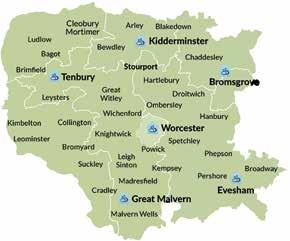

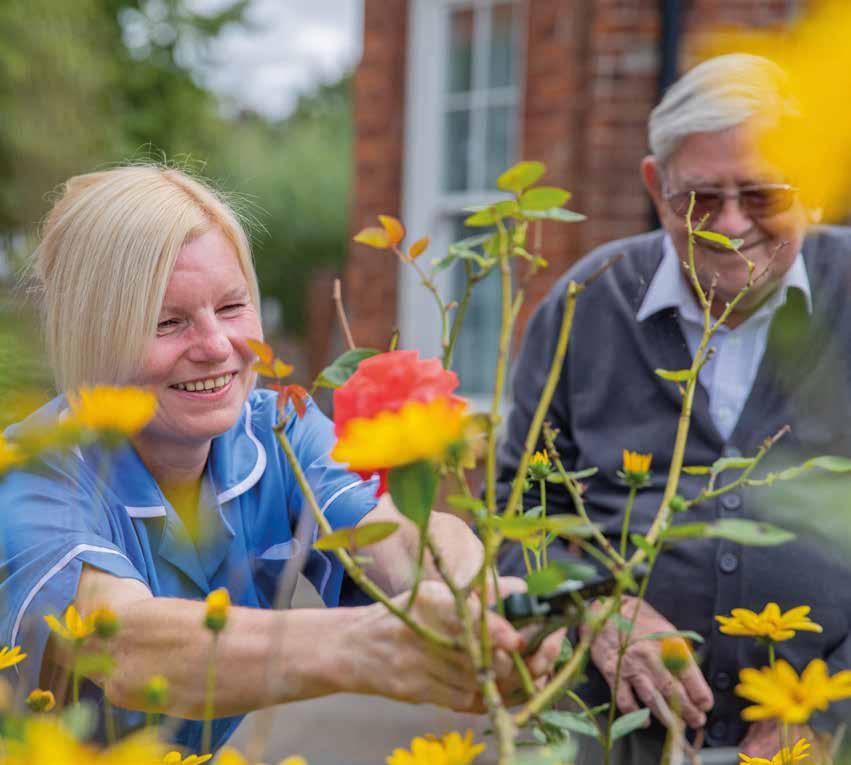
OP D PD LDA MH SI YA AD
Audley Care Ltd – Audley Care Ellerslie
Malvern Advert page 22
Tel: 01684 437101 OP D PD MH SI YA
Beavers (Worcester) Ltd
Malvern
Tel: 01684 576633 OP D PD LDA MH SI YA AD
Bewdley Care Ltd

Kidderminster
Tel: 01562 69771 OP D PD MH SI YA AD
Bluebird Care (Bromsgrove & Redditch)
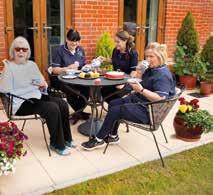
Bromsgrove
Tel: 01527 916442 OP D PD LDA MH SI YA AD
Bluebird Care (Worcester & Wychavon)
Evesham Advert page 26
Tel: 01386 764830 OP D PD YA
Broad Group, The Worcester
Tel: 01905 330602 OP D PD LDA MH SI YA
We
Providing

Business Centre, The Redditch
Tel: 07484 915361 OP D PD LDA YA
Care 4 Me Ltd
Malvern
Tel: 01684 491607 OP D PD MH SI YA
Care Force Ltd
Bromsgrove
Tel: 01527 577247 OP D PD MH SI
Care Group (Malvern) Ltd, The Malvern
Tel: 01684 572156 OP D PD SI YA
Carefour
Worcester Advert page 22
Tel: 01905 699699 OP PD YA
Caremark (Redditch and Bromsgrove)
Redditch
Tel: 01527 521777 OP D PD LDA MH SI YA AD
Caremark (Worcester & Malvern Hills)
Worcester Advert page 18
Tel: 01905 452595 OP D PD LDA MH SI YA AD
Caremark (Wychavon & Wyre Forest)
Worcester Advert page 18
Tel: 01562 543290 OP D PD YA
Caring People
Bromsgrove
Tel: 01527 68680 OP D PD LDA MH SI YA AD
Causeway Care CIC
Evesham
Tel: 07874 136141 LDA YA
Cera Kidderminster
Kidderminster
Tel: 01562 227238 OP D PD LDA MH SI YA
Civicare Central Ltd

Droitwich
Tel: 01905 770110 OP D PD LDA MH SI YA AD
Let our family look after your family.
About Us
All for You Home Care LTD is a professional healthcare service that specialises in all Homecare needs of our clients. We are an established care company with specialist caregivers from various important fields. Our friendly approach is centered on putting the needs of the client first and to understand that an individuals needs are often very different from other individuals.
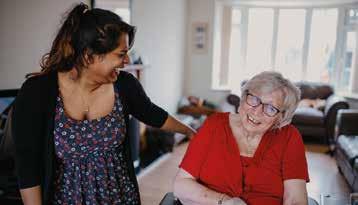


Services B EL I E V E IN G O O D C A R E
• Personal Care
• Qualified Staff
• Medication Assistance
• Mobile Services
• Continence Assistance
• Grocery Shopping
• Assistance with Eating
• Companionship
• Games & Crafts
24 hour support Call: 01527 758 448 Or visit: afyhomecare.co.uk
5 Church Green East, Redditch, B98 8BP, United Kingdom

Our dedicated Care Team are here to help support you with 24/7 care provision should it be required. At TLC Care At Home, we are dedicated to supporting people with a wide range of needs, including Dementia, Acquired Brain Injury, Physical Disabilities, Learning Disabilities, Sensory Impairments and supporting our aging population.
Depending on your individual needs, we can offer varying degrees of support from young adults to very mature people. TLC Care at Home are here to help anyone who requires care and support to enable them to remain living at home for as long as it is safe to do so.
Please contact us now for more information 01299 272 897
Email: wecare@tlc-careathome.co.uk
Website: www.tlccareathome.com

• Domiciliary Care


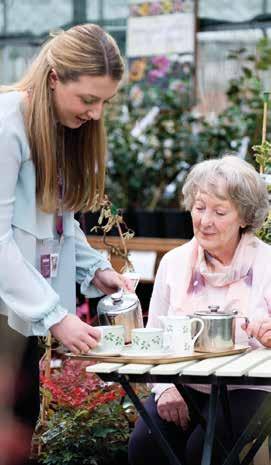
• Palliative care
• Personal care
• 24 hour care
• Companionship
• Dementia Care
• Overnight Care
• Elderly Care
• Care for young adults
• Supporting younger people
• Domestic services: cleaning, cooking, washing and shopping

• Collections of pensions or prescriptions
• Trips out and about
OP LDA YA
First Care Solutions Ltd
Evesham Tel: 07958 253707 OP D PD LDA MH SI YA
Full Care Solutions Ltd
Evesham Tel: 01386 329400 OP D PD SI YA
Good Oaks Home Care – Worcester Worcester Tel: 01905 950409 OP D PD LDA SI YA
Happylife Care Worcester Tel: 07401 772572 OP D PD LDA MH SI YA
Helping Hands Evesham and Cotswold
Evesham Advert page 28
Tel: 01386 258 315 OP D PD LDA MH SI YA
Helping Hands Redditch & Bromsgrove
Bromsgrove Advert page 28
Tel: 01527 958 155 OP D PD LDA MH SI YA AD
Helping Hands Worcester Worcester Advert page 28
Tel: 01905 814 203 OP D PD LDA MH SI YA
Home Instead Senior Care Evesham
Evesham Advert page 20 Tel: 01905 420404 OP D PD LDA MH SI YA
Home Instead Senior Care Kidderminster
Kidderminster Advert page 30 Tel: 01562 754757 OP D PD LDA MH SI YA
Home Instead Senior Care Malvern Malvern Advert page 20 Tel: 01684 420404 OP D PD LDA MH SI YA
07878 863 114
M N Pulse Solutions Ltd is a CQC Registered Home-Care provider for adults (18-65+) presenting with challenging behaviours, learning disabilities and/or autism; and mental health needs.
We aim to delight the users of our services by providing the most effective, friendly, and quality care to empower them with independence, choice and rights. We provide them with opportunities to build their future with person-centred care. Working closely with residents, their families, carers and health professionals, we deliver quality support and that helps people on their pathway to independence whilst in the comfort of their own home.

M N Pulse Solutions Ltd provides personal care and specialist support in Worcestershire, West Midlands and surrounding areas but will accept referrals from across England.


www.mnpulsesolutions.co.uk

Radis
Richmond
Spectrum Days
Are you or your loved one living with dementia, sensory impairment or disability?



Are you becoming socially isolated?
Would you like to meet others in the same situation?
Come and join us for a whole range of fun activities including art and craft work, pool, beauty therapy, games, gardening, cooking, relaxation sessions and much more.
Meet others and make new friendships in our friendly and supportive award-winning centres. We are open five days a week, Monday to Friday, 9am5pm. Ask your social worker about funding for this service.
We firmly believe anyone can do any activity they wish, as long as the right support, right environment and right adaptations are in place.
VIP Day Centre Redditch The Barn
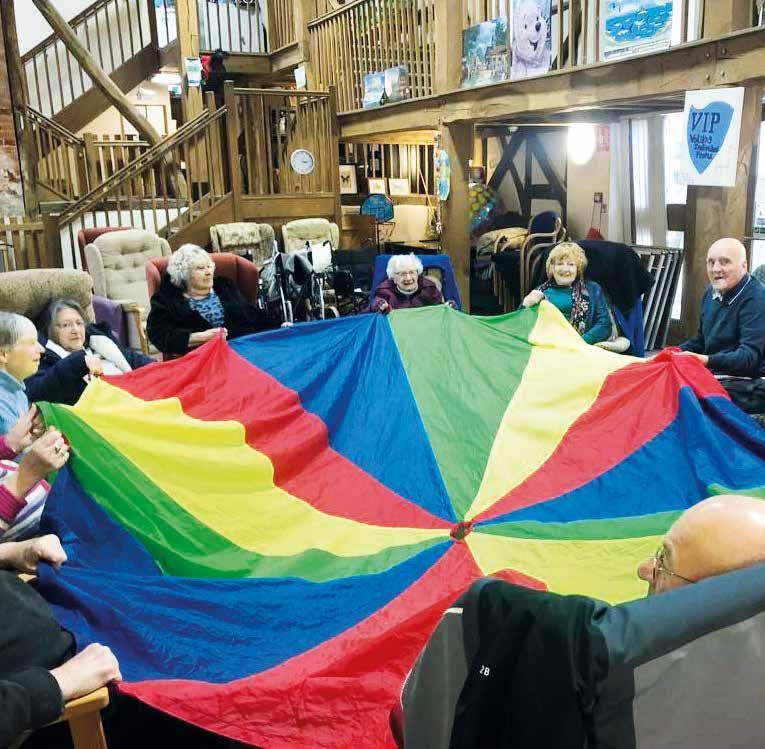
The Craft Centre, Winyates Centre, Redditch, B98 0LA 01527 375014 redditch@vipdaycentre.co.uk

VIP Day Centre Bromsgrove Amphlett Hall
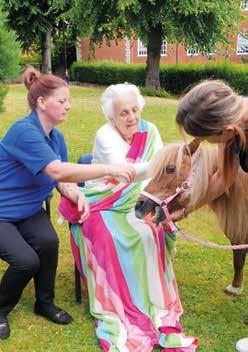
Crown Close, Bromsgrove, B61 8DW 01527 375015

bromsgrove@vipdaycentre.co.uk
Head Office 0330 174 0857
info@vipdaycentre.co.uk www.vipdaycentre.co.uk




VIP Day Centre
@VIPDayCentre
Award winning Day Centre specialising in adult care and supporting individuals to live well with all types of dementia, sensory impairments and disabilities.
For information on home care and how it could help you, see page 19.
Extra Care offers housing for people aged 55 and over. It gives people the opportunity to live in a home of their own with 24/7 support on hand, should the person need it.
Living in Extra Care housing will give you or your loved one independence and choice over their life. It also gives people control over their finances and social lives, maintains privacy and provides flexible support should your needs change.
Tenants of Extra Care facilities have their own front door, privacy and space to live in, but support is always available if it’s needed.
Schemes usually include:
• One- or two-bedroom apartments.
• An on-site restaurant.
• Social and community activities.
• A hairdresser.
Supported Living is a term used to describe situations in which people who have care and/ or support needs rent their home, and their personal care or support is provided by a different organisation. This means they can change their support without having to move or can move and take the same support with them. They may also own their own home. People also have greater security of tenure and can claim a wider range of welfare benefits than in residential care.
Supported Living can be delivered in a range of settings, including individual flats or houses, clusters of self-contained flats on the same site, shared accommodation or Extra Care housing. The individual, a private landlord, a housing association, a local authority or a charity may own the property.
Supported Living refers to the way in which accommodation and support are organised,
• A gym.
• A shop.
Facilities often hold community and social events for residents to engage with one another and meet new people.
The cost of Extra Care is split into three areas:
• Housing – the cost of renting, buying or shared ownership of the home.
• Service charge – this covers home maintenance, communal facilities, support and some utility costs.
• Individual care costs – dependent on the level of care required.
Find out more about Extra Care opportunities in Worcestershire at www.worcestershire.gov.uk (search ‘what is extra care?’).
rather than the amount of support. This will be tailored to individual need and can include access to support 24 hours a day if assessed as necessary, although many people do not require this –particularly with the use of Assistive Technology (discussed on page 13).
Visit the websites below to watch a series of short videos about people’s experiences of Supported Living.
Anne’s story Web: https://youtu.be/44gCz6Vexts
Claire’s story Web: https://youtu.be/oh3l-dVVyf4
Joanne’s story Web: https://youtu.be/Wp6tqFLlDI0
Shared Lives offers individuals with eligible needs the opportunity to be supported in a family setting. Shared Lives providers are care workers who open their homes to adults who may have learning difficulties, learning disabilities, mental health conditions, physical disabilities or dementia. Care workers provide long-term or replacement care, support and accommodation.
Shared Lives providers can support individuals with daily routines, for example helping with personal care, attending appointments, and accessing the local community. They also provide friendship, support with gaining independence and help people to continue doing the things they enjoy.
The Government has indicated that services for people with disabilities should promote the following key principles:
• Respect people’s rights.
• Actively promote people’s independence.
• Ensure that people have, and can make, choices in all areas of their lives.
• Create opportunities for people to be included rather than separated from society.
If you are assessed as eligible for support, we can help you find the right support to meet your needs. Services can include help in the home (explained on page 19), adaptations and equipment (see page 10) and holidays. If you are not eligible for services, we can provide you with information and advice tailored to your individual needs and your carer’s.
For people looking to move out of their family home or leaving school or college there are several options that could be explored, such as living in your own home with support, a Supported Living scheme (explained on page 36) or residential care. These options can give greater independence and choice.
Shared Lives can make a real difference to people by helping them to live as independently as possible, supporting new life experiences and social inclusion. Shared Lives is registered with the Care Quality Commission (CQC). View the latest inspection ratings at www.cqc.org.uk/location/1-982233179
If you are interested in the scheme, you can download the Shared Lives booklet or watch videos about what it’s like to live in a Shared Lives placement.
Tel: 01905 765622
Email: sharedlivesadmin@worcestershire.gov.uk Web: www.worcestershire.gov.uk/info/20563/ shared_lives_scheme
If you, or someone you care for, has a learning disability and would like to know more about what housing options are available to you, you can download a guide produced by the Worcestershire Learning Disability Partnership Board. This guide has been written in easy read, visit www.worcestershire.gov.uk and search ‘learning disability housing options’.
Community Learning Disability Teams (CLDTs) work with adults aged 18 and over who have a learning disability and cannot manage without the right kind of support. These teams work in partnership with Community Learning Disability Health Teams to provide joined up, holistic support.
You can get help and advice on problems you may be experiencing with being listened to or understood, your education, keeping well, money and work, somewhere to live, things to do and helping others to care for you.
Support can come from social workers, community nurses, dieticians, occupational therapists, physiotherapists, psychiatrists, psychologists, speech and language therapists or your doctor.
Support can also come from your local community in the form of services from the voluntary sector. The CLDTs will also help you get advice and support on
It is important to look after your mental health and wellbeing. Some mental health conditions, such as depression and anxiety, are common. Looking after your state of mind is just as important as taking care of your body. If you do feel down, anxious or distressed, you are not alone. If you are experiencing these symptoms, it’s important to get the right treatment.
Your GP should be your first point of contact if you need help with a mental health condition or you are concerned about your mental health.
There are also services you can self-refer to, such as Worcestershire Healthy Minds or the Worcestershire Wellbeing Hub Resource Directory.
Adult mental health teams
Worcestershire Healthy Minds
This service provides assessment and psychological interventions to patients aged 16 and over, presenting with common mental health conditions such as anxiety and/or depression in the Improving Access to Psychological Therapies (IAPT) model. The service consists of a comprehensive range of mental health specialties within one service:
• Cognitive Behavioural Therapy service.
• Counselling and Psychology service.
• Gateway Worker service.
Within each specialty, the service aims to provide as early an intervention as possible, preventing problems from escalating and signposting to appropriate services where necessary. Treatment consists of individual, group and digital online therapy and aligns with evidence-based practice. Web: www.healthyminds.whct.nhs.uk
Worcestershire Wellbeing Hub Resource Directory
An information and signposting service for people over the age of 16 who are experiencing
advocacy, benefits, housing and from the police if necessary. Contact Worcestershire County Council on 01905 768053 for more information.
low mood, anxiety or stress, and feel that they would benefit from support from local community providers.

Web: http://worcestershire.wellbeinghub.org.uk
Community mental health support
In October 2021, new funding created the Neighboured Mental Health Team (NMHT). This allowed the previous Community Assessment and Recovery Service (CARS) to combine with its community partners Onside, Worcestershire Association of Carers and Springfield MIND to form the new NMHT.
The NMHT is staffed by mental health professional nurses, occupational therapists, psychiatrists, psychologists, community support workers and people with lived experience of mental illness. There will also be access to employment and vocational specialist teams.
The NMHT will be at the centre of the local community, using its resources to maximise support and allow people to live independently. The aim is to deliver a new approach to supporting people with complex mental health needs in the local community, reducing the barriers between services and making access to care easier and more seamless.
The NMHT will use a ‘no wrong door’ and shared care approach to service delivery. If a GP and service user feel that a mental health need is present, the GP can access appointments with a mental health professional which can be booked at the time. The NMHT will work closely with mental health social workers based at Worcestershire County Council.
If you have a physical disability or a long-term condition, Adult Social Care, in partnership with organisations in the independent and not-for-profit sectors, can provide you with advice and information and connect you to a range of resources, technology and services, in local communities, to help you live as independently as possible.
Alternatively, people can review our Here2Help
The service provides support to adults who are:
• Severely sight impaired or sight impaired with a diagnosed sight loss.
• Deaf or hard of hearing having been assessed by an audiologist.
• Deafblind or have a degree of dual sensory loss.

The sensory service includes rehabilitation workers, social care workers and deafblind service co-ordinators who provide specialist assessment, information and advice.
The service also provides rehabilitation training in mobility and daily living skills and may provide equipment to help maintain or regain your independence.
The sensory service can also carry out carers’ assessments where the carer is supporting someone with a sensory impairment.
Advocacy services aim to support people to have their voices heard and their views, wishes and individual needs considered during decision-making processes. It ensures that people are treated fairly and not subject to discrimination or unfair treatment.
A range of advocacy services is provided including:
• Crisis and Issue/Community Advocacy –for people who may be vulnerable or face disadvantage and need an advocate to help with
Community Services Directory designed to help you search a wide range of services and support offered by charities, community groups, businesses, public sector and other organisations in your local area and across Worcestershire. Visit www.worcestershire.gov.uk/here2help
There are also services available to support someone who may be your carer. See page 15.
RNIB
Tel: 0303 123 9999
Email: helpline@rnib.org.uk
Web: www.rnib.org.uk
RNID
Tel: 0808 808 0123
Textphone: 18001 0808 808 0123
SMS: 07360 268988
Email: contact@rnid.org.uk
Web: www.rnid.org.uk
Sense
Tel: 0300 330 9256
Textphone: 18001 0300 330 9256
Email: info@sense.org.uk
Web: www.sense.org.uk
one-off issues. The aim is to empower people to do more for themselves, make informed choices and promote independence. This is a non-statutory service so is subject to availability.
• Independent Mental Health Advocacy (IMHA) –for people subject to detention under the Mental Health Act. IMHA is independent of any person who is professionally concerned with the patient’s medical treatment and operationally independent of health and social care providers.
Independent Mental Capacity Advocacy (IMCA) – for people who lack capacity to make decisions concerning a long-term move or changes in accommodation or serious medical treatment. IMCA is independent of any person who is professionally concerned with the individual. It is to provide support to people covered by the Mental Capacity Act 2005. It is also for people who have nobody else to represent them or who may not be appropriate to be consulted in the process of working out their best interests. IMCA may also be involved in other decisions such as care reviews and adult safeguarding.
• Relevant Persons Representative (RPR) – once a Deprivation of Liberty Safeguards (DoLS)* authorisation is granted, a paid RPR is instructed so that the person can appeal or review the DoLS authorisation. There are paid RPRs for befriended people and for anyone in a care home under a DoLS authorisation with or without family. The RPR role is to explain the authorisation to the person (if possible), request a review of the DoLS or take the case to a Court of Protection appeal. The role is to ensure people’s rights under the Mental Capacity Act are respected and upheld.
• NHS and Adult Social Care complaints – available for people who wish to make a complaint about Adult Social Care or their NHS care or treatment. This service is the provision of short-term advocacy, which empowers and assists patients and individuals who want to make a complaint and need some support to do this.
• Care Act Advocacy – for people who would have substantial difficulty in being involved in their own care and support process or safeguarding.
Worcestershire Acute Hospitals NHS Trust has a specialist palliative care team which provides advice and support for patients with advanced life-limiting illnesses and their families and carers. Based at the Alexandra Hospital, Redditch and Worcestershire Royal Hospital, the team also provides clinical advice and education to professional staff such as doctors and nurses.
St Richard’s Hospice cares for patients and families in Worcestershire who are living with
It is for people who don’t have another appropriate person to provide this support or who are not willing or able to do this. The aim is to help people express their wishes and feelings, support them in weighing up their options and assist them in making their own decisions.
• Appropriate Adult (AA) – to support vulnerable adults who have been detained by the police for interview. The AA’s role is to ensure the detained person understands what is happening to them and why.
*DoLS is set to be replaced by the Liberty Protection Safeguards. For more information, get in touch with the organisations listed on page 56.
These services help to protect the rights of some of the most vulnerable people, enabling them to:
• Express their views.
• Obtain and understand independent advice and information.
• Have access to services and support to meet their needs.
• Negotiate and resolve conflict.
Onside Independent Advocacy
Williamson House, 14 Charles Street, Worcester WR1 2AQ Tel: 01905 27525
Email: info@onside-advocacy.org.uk (general enquiries) and accesshub@onside-advocacy.org.uk (referrals). Web: www.onside-advocacy.org.uk
life-threatening illnesses. Each year, the hospice gives free care and support to around 2,500 patients and family members, helping them towards the best quality of life possible. Visit www.strichards.org.uk for more information.
KEMP Hospice provides a major support system for the Wyre Forest Community. Its primary goal is to provide palliative care and support, adding to the quality of life for patients and their carers. Find out more at www.kemphospice.org.uk






All care home providers in England must be registered with the Care Quality Commission (CQC). All services are inspected by the CQC, which reports on its findings and rates each home. These inspection reports and ratings are available at the

Care homes (personal care only)
If you need someone to look after you 24 hours a day, but don’t need nursing care, a care home offering only personal care may be an option. Personal care includes bathing, feeding, dressing and help with moving but it must be paid for in full if your capital/savings exceed £23,250. This figure may change during the lifetime of this Directory. See page 48 for more information on paying for your care.
A care home with nursing provides the same care and support as a care home offering personal care, but with 24-hour nursing staff on hand. If you think you may need nursing care in a home, and are not
The word ‘activity’ can imply many different things but, in the context of a care home, it should mean everything a resident does from when they open their eyes in the morning until they go to sleep at night.
Activities should stimulate residents emotionally, physically, and mentally and, in a good care home, should encompass all aspects of daily life. They can range from choosing what to wear, to helping with tasks around the home or garden, to listening to the radio or joining in with an art or exercise class. Above all, activities provide a point of interest, fun and challenge to each day. They should enable people to participate in daily life, be engaged and maintain hobbies or activities they have enjoyed throughout their life, as well as offering the opportunity to try something new, if they wish.
home or from the CQC website (www.cqc.org.uk).
Before you decide whether to move into a care home, you might like to contact Worcestershire County Council for a needs assessment (see page 7).


self-funding your care, you will need to have an assessment to determine Care Act 2014 eligible needs and discuss how those needs are best met.
If the outcome is that a care home providing nursing care is the agreed option, a social care worker will work with you to look at the options available. The cost of the nursing care part of your fees is paid by the NHS to the home directly: the current amount is £209.19 per week, see page 50 for more information. This figure may change over the lifetime of this Directory.
For help with finding care homes and care homes with nursing, visit www.carechoices.co.uk to search across the country.
Lots of care homes now employ a dedicated activity co-ordinator. What they do and how they do it varies from one home to another. Increasingly, they are fully integrated into the staff team, play a key part in developing care plans and ensure that all staff appreciate the part they play in delivering high-quality activity provision.
Ensure you speak to any potential providers about the activities they provide in their care home.
Everyone With so many providers to choose from, where do you start?
That’s www.carechoices.co.uk
experts in our care





belief
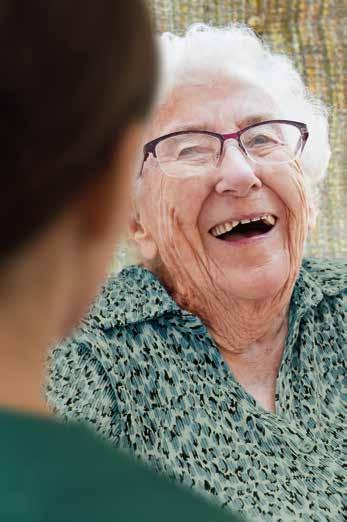
We suggest that you take paper with you when visiting care homes so that you can make notes. You can download and print this checklist at www.carechoices.co.uk/checklists
What is the minimum number of staff that are available at any time?
Are staff respectful, friendly and polite?
Are staff suitably trained and experienced?
Are the staff engaging with residents?
Can you get involved in activities you enjoy?
Is there an activities co-ordinator?
Does the home organise any outings?
Are residents escorted to appointments?
Do the residents seem entertained?
Does the home have a varied activities schedule?
Is the home adapted to suit your needs?
Can you bring your own furniture?
Are there enough plug sockets in the rooms?
Are there restrictions on going out?
Is there public transport nearby?
Does the home provide any transport?
Can you make/receive calls privately?
Can you decide when to get up and go to bed?
Does the home allow pets?
Does the home use Digital Care Planning accessible to families?
Is the home too hot/cold? Can you control the heating in your room?
Is the décor to your taste?
Are there restricted visiting hours?
Is there somewhere you can go to be alone?
Does the home feel welcoming?
Can the home cater for any dietary requirements you may have?
Does the menu change regularly?
Can you eat when you like, even at night?
Can you have food in your room?
Is there a choice of food at mealtimes?
Is alcohol available/allowed if you want it?
Can visitors join you for meals?
Do your fees cover all of the services and activities?
Are fees likely to change regularly?
Is the notice period for cancellation of the contract reasonable?
Could you have a trial period?
Can you keep your room if you go into hospital?
Can you handle your own money?
Will your support plan be reviewed at regular intervals?
Can you lodge a complaint easily?
Are complaints dealt with quickly?
Are there any suspensions to admissions in place?
Can you see a copy of the agency’s CQC registration and quality rating?
*See page 54

We suggest that you take paper with you when visiting care homes so that you can make notes. Please use this checklist in conjunction with the care homes checklist on page 45. You can download and print this checklist at www.carechoices.co.uk/checklists
Are there clear signs throughout the home?
Has the home been designed or adapted for people with dementia?
Are the home and grounds secure?
Are there prompts outside the residents’ rooms to help people identify their own?
Is the décor familiar to your loved one?
Do residents get a choice in terms of what they wear each day?
Are residents encouraged to be independent?
Can residents decide what to do each day?
Can residents have a say in the décor of their room?
Are residents able to join in with household tasks like folding washing?
Are there activities on each day?
Can residents walk around outside on their own?
Are residents sitting in front of the TV or are they active and engaged?
Are there rummage boxes around?
Can residents get help with eating and drinking?
How often does the home review residents’ medication?
Does the home offer help if a resident needs assistance taking medication?
Do GPs visit the home regularly?
Are staff trained to identify when a resident might be unwell?
Are staff trained to spot when someone needs to go to the toilet?
Do the staff have any dementia-specific training/experience?
Will your loved one have a member of staff specifically responsible for their care?
Does the home follow a specific approach to dementia therapy, for example, validation therapy?
Will the home keep you informed about changes to your loved one’s care?
Does the home have a specific approach to end of life care?
Does the home keep up to date with best practice in dementia care?
Will your support plan be reviewed at regular intervals?
Can you lodge a complaint easily?
Are complaints dealt with quickly?
Are there any suspensions to admissions in place?
Can you see a copy of the agency’s CQC registration and quality rating?
*See page 54
A good care home will follow the concept of a person-centred approach to care for people with dementia. This means that the unique qualities and interests of each individual will be identified, understood and accounted for in any care planning.
The person with dementia will have an assessment and an ongoing personalised care plan, agreed across health and social care if funded by Worcestershire County Council. This should identify a named care co-ordinator and address their individual needs.
They must also have the opportunity to discuss and make decisions, together with their carers, about the use of advance statements, advance decisions to refuse treatment, Lasting Powers of Attorney and Preferred Priorities for Care. In Worcestershire, this may include completion of a ReSPECT form (Recommended Summary Plan for Emergency Care and Treatment) with support from health professionals and family members or representatives.
It is important that care and support options are tailored to the needs of the individual. Make sure staff know the person you care for by providing life story books, telling staff about their likes and dislikes and providing belongings that bring comfort and have meaning for the person you care for.
Within the home, much is down to the attitude and skills of the manager and the staff. Do they provide an environment that enables a person with dementia
to exercise choice and personal preferences even in the later stages of the condition? Who is the person in charge of championing dementia care best practice in the home?
Further questions to consider are included in the residential dementia care checklist on page 47.
The design of a care home specialising in dementia needs to be based on small group living, preferably with accommodation on one level and with opportunities to go in and out of the building within a safe environment.
Plenty of natural light and an easy way of finding one’s way around the building and grounds are essential for minimising disorientation.
Dementia-specific training is essential to ensure that care home staff have an understanding of how best to support and care for people with dementia. Ask about the Dementia Friends Ambassador and question the placement if the home does not have a specific Dementia Lead. For more information, visit www.dementiafriends.org.uk
For help with finding a care home for someone with dementia, visit www.carechoices.co.uk to search for care homes across the country.
When a local authority provides or arranges your care services, you may be asked to contribute towards the cost of care at home or in a care home, depending on your personal circumstances.
Until a full financial assessment is carried out, visit www.worcestershire.gov.uk and search
To determine whether you will need to contribute towards the cost of your support, Worcestershire County Council will conduct a financial assessment.
‘charges for care and support’. Here, you will find an online financial assessment link. This indicates your possible contribution and submits your details to the Care Contribution Team to enable a full financial assessment to be completed once you have been assessed as having a care need by your social worker.
This will look at your capital, savings and income. Most people are likely to have to contribute something towards the cost of their care.
The value of your home is included as part of your capital in this assessment if you are moving into residential care, except in limited circumstances. It is not included if you are receiving care in your own home. If you choose not to have a financial assessment, you will be responsible for paying the full cost of your care and support.
If you have capital and savings of less than £23,250, you will be asked to contribute part of your income and Worcestershire County Council may meet the shortfall.
If you have capital and savings of between £14,250 and £23,250, you are likely to have to contribute towards the cost of your care. You may need to contribute part of your income, and a sliding scale operates whereby you also contribute £1 for each £250 you have in capital and savings above the lower figure.
If your capital and savings are likely to reduce to £23,250 through payment of care home fees, you must let Worcestershire County Council know well in advance. We must undertake an assessment of your circumstances before deciding if we will make a contribution.
If you become eligible for our support with funding your care, and the home you are living in charges more than our fee levels, you must find someone to help pay the difference. This is known as a ‘top-up’ or ‘third party payment’; see page 50 for
Some non-means-tested support may be available to you; you may wish to explore these options
Attendance Allowance and Personal Independence Payments are non-means-tested, non-taxable benefits from the Department for Work and Pensions. There are different rates depending on the level of your needs. Everyone who needs care should consider claiming these benefits.
If your capital and savings amount to more than £23,250, you will have to pay the full cost of your care yourself. However, you are still entitled to an assessment of your needs from us and you may be able to get some support with funding your care, see page 50.
These figures may change during the lifetime of this Directory.
If you are eligible for a financial contribution towards your support from us and you are moving into a care home or care home with nursing, you will be given a choice of homes that accept the fee level we would usually pay for someone with your needs. If the home you choose charges a fee in excess of our funding limit, you will need to find someone else to meet the additional amount. This is often referred to as a ‘third party payment’ or ‘top-up’ (explained further on page 50).
more information. If funds for a top-up are not available, you will need to find accommodation which can meet your needs at our fee level.
Understanding your rights before moving into care is essential. There are a number of financial products and specialist companies that may be able to help.
It is important to seek independent financial and legal advice before committing yourself to anything. See page 51 for more information.
before approaching Worcestershire County Council for a financial assessment.
You cannot usually get Attendance Allowance if you live in a care home and your care is paid for by your local authority.
You can still claim Attendance Allowance if you pay for all your care home costs yourself.
If you are entitled to the mobility component of Disability Living Allowance or Personal Independence Payment, this payment will not stop once you are in a care home and is not included in your financial assessment.
You may also want to consider applying for Universal Credit (if you are under pension age) or Pension Credit (if you are over pension age).
Paying for care can be an expensive and long-term commitment, so it is recommended that you seek specialist information and advice before entering into any arrangements. It is important that you seek specialist advice from appropriately qualified and regulated financial advisers; see page 51 for suggested contacts.
If your former home is included in your financial assessment but your other capital and savings are less than £23,250, and your income is not enough to meet your care home fees, Worcestershire County Council may share the cost of the first 12 weeks of permanent care, provided it agrees that care is needed.
After the twelve-week property disregard period,
If you are eligible for financial support from us, you should be offered a choice of homes that meet our funding rates. If you decide to live in a more expensive home and someone is able to make an additional payment for you, they will have to pay the difference between our rate and the amount the home charges. This additional payment is called a ‘top-up’ or ‘third party payment’.
In certain circumstances you may be able to pay this yourself. However, in most cases the responsibility usually falls to a family member, friend or charity.
Before anyone agrees to pay your top-up, they should be aware that the amount may increase,
NHS Continuing Healthcare is fully funded care and support, provided and paid for by the NHS. To be eligible, your needs must be primarily health related and are likely to be severe.
If you are eligible for NHS Continuing Healthcare, you can receive the services in any setting, including your own home or in a care home.
you may be considered for a Deferred Payment Agreement. This will allow you to delay selling your former home during your lifetime. Any fees paid by Worcestershire County Council will be charged against the value of your home and must be repaid once the house is sold from your estate. Interest is payable throughout the period of the loan and there is an initial fee to join the scheme and annual fee thereafter, which covers all legal and administrative costs for the lifetime of the loan. Worcestershire County Council may limit the amount of the loan.
Whether you are a temporary or permanent resident, if you live in a care home that provides nursing care, you may be entitled to a non-means-tested Registered Nursing Care Contribution (sometimes referred to as Funded Nursing Care) towards the cost of your nursing care. This is paid directly to the home.
usually once a year, and they need to be confident that they can sustain the payments for as long as they are required. They will need to sign a contract with Worcestershire County Council to confirm that they can do this. If the additional payments stop being paid for any reason, then you should seek help and advice from us. You may have to move to a different home within our funding levels.
If you are already a resident in a care home, and no top-up was required at the time you became a resident, the home may seek to introduce one at a later date, which would need to be agreed first with Worcestershire County Council.
This may happen if a change to your arrangements is made at your request or with your agreement, for example you move to a more expensive room.
It is important to note that councils have a duty to offer you a place at a home that accepts their funding rates. If no such place is available, a top-up should not be charged.
Planning for your future care and support needs can be complicated and funding care can be expensive. Professional advice may be helpful in enabling you (and your family) to identify the most suitable and cost-effective solution.
Everyone is encouraged to seek unbiased, expert advice from independent financial advisers to help work out how to pay for long-term care. Independent financial advisers are regulated by the Financial Conduct Authority (FCA) and must take shared responsibility for the suitability of any product they recommend.
Unlike advisers who are tied to particular providers, specialist care-fees advisers can offer advice on products from across the whole market.
A list of independent financial advisers who are accredited by the Society of Later Life Advisers can be found at www.societyoflaterlifeadvisers.co.uk

Alternatively, you can call 0333 202 0454
There are also a number of organisations that will provide free advice about funding care and support. These are a good place to start if you are looking for information and want to see what sort of options are available.
Age UK
Tel: 0800 055 6112
Web: www.ageuk.org.uk/moneymatters
Citizens Advice
Web: www.citizensadvice.org.uk
Money Helper
Tel: 0800 138 7777
Web: www.moneyhelper.org.uk
Paying For Care
Web: www.payingforcare.org
Looking for care in your area? Want to know the quality rating of providers you’re considering? Care Choices, publisher of this Directory, has a website providing comprehensive details of care providers as well as essential information.
You can search by postcode, county or region for care homes, care homes with nursing and home care providers that meet your needs across the country.
Your search can be refined by the type of care you
are looking for and the results can be sent to you by email. They can also be saved and emailed to others.
The website includes detailed information for each care provider, including the address, phone number and the service’s latest CQC inspection report and rating (see page 54), indicating the quality of care provided. You can also view an electronic version of this Directory on the site and have it read to you by using the ‘Recite Me’ function. Visit www.carechoices.co.uk



A solicitor can give you impartial advice about wills, making gifts, estate planning and Powers of Attorney. Some can also offer guidance on immediate and long-term care plans, ensuring (if applicable) the NHS has made the correct contribution to your fees.
Lasting Powers of Attorney (LPA) allow you to appoint someone you trust to make decisions about your personal welfare, including healthcare and consent to medical treatment, and/or your property and financial affairs. An LPA is only valid once registered with the Office of the Public Guardian. It allows for a person of your choice to make decisions on your behalf at a time when you may be unable to.
The Court of Protection can issue Orders directing the management of a person’s property and financial affairs if they are incapable of managing their own affairs should they not have an LPA. The Court procedure is presently very slow, and the fees are quite expensive, so preparing an LPA is always advisable, providing you have somebody sufficiently trustworthy to appoint as your attorney.
If you use a home care agency or move into a care home or care home with nursing, you should feel able to comment on any aspect of your life which affects your happiness or comfort. This might be anything from the way you are treated by staff to the quality of the food you are served. You should also feel free to make comments and suggestions about possible improvements to your surroundings and the services provided.
Making a comment, whether complimentary or a complaint, should not be made difficult for you and should not affect the standard of care that you receive whether in your own home or in a care home or care home with nursing. Care services are required to have a simple and easy-to-use complaints procedure.
If you are concerned about the care that you, a friend or a relative are receiving, it makes sense to speak to the manager of the service about your
An ‘advance directive’ allows you to communicate your wishes in respect of future medical treatment, but it is not legally binding. You may instead wish to make a living will, properly known as an ‘advance decision’, setting out treatment that you do not want to receive in specified circumstances, which would legally have to be followed even if you die as a result.
Any proposed Gift out of your estate needs careful consideration of the benefits, risks and implications, particularly on any future liability for care costs or tax liability.
If you don’t have your own solicitor, ask family or friends for their recommendations. Contact several firms, explain your situation and ask for an estimate of cost and an idea of timescales involved. Many firms will make home visits if necessary and will adapt their communications to meet your needs. It’s important to find a solicitor who specialises in this area of the law. Citizens Advice offers an advice service and can recommend solicitors in your area. Visit www.citizensadvice.org.uk
concerns before you take any further action. The problem may be resolved quite easily once they are made aware of it. However, if you need to make a formal complaint, you should initially contact the registered owners of the service. They have a duty to respond to any complaints made.
If your complaint is about a breach of regulations, contact your local office of the Care Quality Commission (see page 54 for more information).
If your local authority has arranged or contributed to the cost of your care and support, another option is to raise your complaint with your social worker/ care manager or the department’s designated complaints manager.
Consumer Relations OfficerWorcestershire County Council, Consumer Relations, County Hall, Spetchley Road, Worcester WR5 2NP
Tel: 01905 846365
Email: representations@worcestershire.gov.uk
Web: www.worcestershire.gov.uk (search ‘compliment, comment or complaint’).
If you have been unable to resolve your complaint you can contact the Local Government and Social Care Ombudsman on 0300 061 0614 and ask them
Health and social care services must be registered to show that they meet a set of standards. The Care Quality Commission (CQC) is the independent regulator of health and social care in England. It registers care providers and inspects and rates services. When things go wrong, the CQC can also take action to protect people who use services.
After an inspection of a care home or home care agency, the CQC publishes a report of what it found. The report looks at how well the service meets the CQC’s five key questions: Is the service safe? Effective? Caring? Responsive to people’s needs? Well led?
Each care home and home care agency will get an overall rating of outstanding, good, requires improvement or inadequate. It will also get ratings for each key question. The ratings mean you can
You might have concerns about abuse or neglect for yourself or someone you know.
• If it is an emergency, dial 999
• To report a crime or potential crime to the police, you can phone the non-emergency number 101.
Sometimes adults with care and support needs are unable to protect themselves from the risk or experience of abuse or neglect.
to assist you. The Local Government and Social Care Ombudsman looks at complaints about councils and some other authorities and organisations, including Adult Social Care providers (such as care homes and home care providers).
It is a free service, and its job is to investigate complaints in a fair and independent way.
easily see where a service is performing well, and where it needs to improve.
It’s always a good idea to check inspection reports and ratings when choosing a care service. You can find reports and ratings on the CQC’s website (www.cqc.org.uk ). Care providers must also display their latest rating at their premises and on their website.
You can also tell the CQC about your experiences of care – good or bad. It can use your information to see where it should inspect next, and what to look out for when it does. If you want to share your experience of care, visit www.cqc.org.uk/share
Tel: 0300 061 6161
Email: enquiries@cqc.org.uk
Web: www.cqc.org.uk
Write to: The Care Quality Commission, Citygate, Gallowgate, Newcastle upon Tyne NE1 4PA
• To report a safeguarding concern, call 01905 768053.
The information below tells you more about safeguarding adults and what happens when you report abuse or neglect.
‘Safeguarding’ is a term that describes the arrangements for protecting them, and it is a legal duty.
The Care Act 2014 sets out the safeguarding responsibilities of local services who must work together to safeguard adults in a way that supports them in making choices and having control over how they want to live.
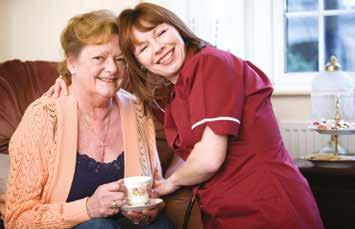
Abuse or neglect is an action, or lack of action, that leads to harm occurring to another person. Abuse or neglect may be deliberate or result from negligence or ignorance. The Care Act 2014 and statutory guidance set out what is recognised as forms of abuse.
Your safeguarding concern will be passed to the Adult Safeguarding Team who will arrange for someone to contact you.
You will be asked what you wish to achieve from the safeguarding arrangements and whether you have support or need an advocate to help you explain what you want to happen. See the ‘Independent support’ section adjacent.
You will be asked who you want to be involved. Further information may need to be gathered and a decision will need to be made regarding whether a formal section 42 enquiry is required or whether there is other action that should be taken. A section 42 enquiry refers to the part of the Care Act 2014 which places a duty on Worcestershire County Council to make appropriate enquiries into the concern reported. The aim of this process is to assist you to live the life you want, with support and protection if needed.
Further information may need to be gathered and a decision will need to be made regarding whether Worcestershire County Council must make enquiries, or instruct an agency to do so, whenever abuse or neglect is suspected. Again, this is called a section 42 enquiry.
We will need to establish whether the person you are concerned about has capacity to consent to the safeguarding response, and whether they need an advocate to support them. If you tell us you are worried about someone being abused, you may not always be told all the details of actions taken. This is because we have a duty to keep information about people safe.
Worcestershire County Council will arrange for an independent advocate (see page 40) to represent and support a person who is the subject of a Safeguarding Enquiry or a Safeguarding Adult Review, if they need help to understand and take part in the enquiry or review, and to express their views, wishes or feelings. If an individual is felt to be lacking capacity to engage with the safeguarding arrangements, a Mental Capacity Assessment will be completed to test whether the person has capacity to make decisions about their protection.
More information about adult safeguarding can be found at www.worcestershire.gov.uk/ safeguardingadults

(WSAB) promotes wellbeing and helps to reduce the risk of harm for people with care and support needs. It operates at a strategic partnership level with health and social care services to monitor the effectiveness of the safeguarding work carried out by partner members and partner agencies.
More information on the WSAB can be found at www.safeguardingworcestershire.org.uk
There is a barring system for all those intending to work or currently working with children's and adults' care and support. This service combines the criminal records checking and barring functions. For disclosure information and services, visit www.gov.uk/dbs
Care home owners, home care agencies and employment agencies that supply care workers are required to request checks as part of a range of pre-employment checks, including disclosures from the DBS.
Care providers and suppliers of care workers are also required to refer workers to the DBS where, in their view, the individual has been guilty of misconduct that harmed or placed at risk of harm an adult with care and support needs. People who know they are confirmed on the list but seek employment in care positions will face criminal charges, including possible imprisonment. It is also an offence for an employer or voluntary organisation to knowingly employ a barred person in a regulated activity role.
Some adults are unable to make decisions for themselves because they lack the mental capacity to do so. This may be due to dementia, a learning disability, mental disorder or a severe brain injury. These people may need more care and protection than others to ensure they do not suffer any harm.
It may be necessary to apply restrictions that deprive them of their liberty in order to prevent harm. Depriving someone of liberty can include ensuring a person cannot leave, giving care or medication that controls the person’s choices and actions, or going against the wishes of family.
This applies whether the restrictions are actively applied or only potentially and applies whether or not the person objects themselves.
In these cases, the staff responsible must apply to the local Deprivation of Liberty Safeguards (DoLS) Team for an assessment. Failure to do so may be a breach of the law. The assessments check that restrictions within the care are necessary, in the person’s best interests, and lead to a DoLS Authorisation. No costs are involved to the person or family.
Are you concerned that someone you know is being deprived of their liberty?
If you think someone you know is being deprived of their liberty and the deprivation is not authorised, the first step is to approach the staff who are looking after them to see if care could be given
in a way that is less restrictive. If not, ask whether they have taken the necessary steps to request a DoLS assessment. It does not matter whether you think the care is necessary or not – an authorisation should still be requested.
If the staff do not act, contact the DoLS Team. If there is an authorisation in place but you think the level of restriction exceeds that which is necessary, you can also query this – ask the staff to contact the DoLS Team to request a review of the authorisation.
In either of the above circumstances, if you have attempted to address your concerns with the staff concerned, but you remain uncertain about the care arrangements, please contact the DoLS Team and it will be looked in to formally. The team also offers advice.
DoLS is set to be replaced by the Liberty Protection Safeguards. For more information, get in touch with the organisations listed below.
You can contact the Worcestershire County Council DoLS Team by calling 01905 822624
Learn more about the Mental Capacity Act 2005 and what it means for you and your family. Visit www.gov.uk and search ‘mental capacity act’.
The Social Care Institute for Excellence website provides more information about DoLS, visit www.scie.org.uk/mca/dols/at-a-glance
You can also see Alzheimer’s Society’s factsheet on DoLS by searching ‘DoLS’ at www.alzheimers.org.uk











In certain circumstances, an application may need to be made to the Court of Protection Find out more about this at www.gov.uk/courtstribunals/court-of-protection




















with your search

With so many providers to choose from, where do you start?
Barn, The East Barn, Birmingham Road, Hopwood, Alvechurch, Birmingham B48 7AJ
Tel: 0116 221 5545 PD LDA YA
Belmont, The
John Comyn Drive, Worcester WR3 7NS
Tel: 01905 677427 OP D
Blenheim House
Moundsley Hall Care Village, Walkers Heath Road, Birmingham B38 0BL
Tel: 0121 433 3000 OP D PD LDA YA
Breme Residential Care Home
46 Providence Road, Bromsgrove B61 8EF
Tel: 01527 571320 OP D PD LDA SI YA
Burcot Grange
23 Greenhill, Burcot, Bromsgrove B60 1BJ
Tel: 0121 445 5552 OP D PD SI YA
CTTM Elmfield Cottage
Alcester Road, Hollywood, Birmingham B47 5NS
Tel: 0121 430 4297 LDA MH SI YA
Exmoor Drive
1-7 Exmoor Drive, Bromsgrove B61 0TW
Tel: 01527 576591 LDA
Grosvenor House Care Home
Aqueduct Lane, Coopers Hill, Alvechurch B48 7BS
Tel: 0121 447 7878 OP
Hillside
Alcester Road, Hollywood, Birmingham B47 5NS
Tel: 0121 430 2126 OP LDA
Hopwood Court
Birmingham Road, Hopwood, Alvechurch B48 7AQ
Tel: 0121 445 4743 OP D PD
Housman Court
School Drive, Bromsgrove B60 1AZ
Tel: 01527 575440 OP D
Kensington House
Moundsley Hall Care Village, Walkers Heath Road, Birmingham B38 0BL
Tel: 0121 433 3000 OP D PD MH YA
Lawns Residential Care, The School Lane, Alvechurch, Birmingham B48 7SB
Tel: 0121 445 4098 OP D PD SI YA
Leys Residential Home, The Old Birmingham Road, Alvechurch, Birmingham B48 7TQ

Tel: 0121 445 5587 Advert below OP D PD MH
Lodge at Burcot Grange, The 23 Greenhill, Burcot, Bromsgrove B60 1BJ
Tel: 0121 445 5552 OP D PD SI YA
Merecroft
Seafields Lane, Alvechurch, Birmingham B48 7HN
Tel: 0121 706 9902 LDA MH YA
Redwood House Residential Home
Cherry Hill Road, Barnt Green B45 8LL
Tel: 0121 447 7447 OP D PD SI
Regents Court Care Home
128 Stourbridge Road, Bromsgrove B61 0AN
Tel: 01527 879119 OP D
School Drive, 7 (Dimensions)
Spadesbrook House, Bromsgrove B60 1AX
Tel: 01225 335066 LDA
Wythall Residential Home
241 Station Road, Wythall, Birmingham B47 6ET
Tel: 01564 823478 OP
Old Birmingham Road, Alvechurch B48 7TQ
Contact: Jeanette Westwood
Tel: 0121 445 5587
At The Leys, we believe in providing a home for our residents, and the care we would want for our own loved ones.
www.facebook.com/theleysresidentialhomealvechurch
Bluebrooke Nursing & Residential Care Home




242 Stourbridge Road, Catshill, Bromsgrove B61 9LE
Tel: 01527 877152 OP D PD LDA SI YA
Buckingham House
Moundsley Hall Care Village, Walkers Heath Road, Birmingham B38 0BL
Tel: 0121 433 3000 OP D YA
Chandler Court
Recreation Road, Bromsgrove B61 8DT
Tel: 0333 455 2317 OP D PD MH YA
Grosvenor House Care Home
Aqueduct Lane, Coopers Hill, Alvechurch B48 7BS
Tel: 0121 447 7878
Havencroft Nursing Home
Lea End Lane, Hopwood, Birmingham B48 7AS
Tel: 0121 445 2154
Heathbrook House Bupa Care Home
223-229 Worcester Road, Stoke Heath, Bromsgrove B61 7JA
Tel: 01527 903620 Advert page 62
Kenilworth House
Moundsley Hall Care Village, Walkers Heath Road, Birmingham B38 0BL
Tel: 0121 433 3000
Kensington House
Moundsley Hall Care Village, Walkers Heath Road, Birmingham B38 0BL
Meadows Nursing Home, The 656 Birmingham Road, Spring Pools, Bromsgrove B61 0QD Tel: 0121 453 5044

Moundsley House Walkers Heath Road, Birmingham B38 0BL Tel: 0121 433 3000
St John’s Court
St Johns Street, Bromsgrove B61 8QT
Tutnall Hall Care Home
Tutnall Lane, Bromsgrove B60 1NA Tel: 01527 875854
Wayside Care Home

25 New Road, Bromsgrove B60 2JQ Tel: 01527 837774
If you are considering a care home with nursing, see the checklist on page 45.

Avenue Care Home, The 23 Avenue Road, Malvern WR14 3AY
Tel: 01684 575922 OP LDA MH
Beechwood Residential Care Home
The Beeches, Holly Green, Upton-upon-Severn WR8 0RR
Tel: 01684 595959 OP D PD SI YA
Blossom House Residential Home
5 Avenue Road, Malvern WR14 3AL
Tel: 01684 574000 Advert page 60 OP PD YA
Chace Rest Home, The Chase Road, Upper Welland, Malvern WR14 4JY
Tel: 01684 561813 OP D YA
Cleeve House
49 Hornyold Road, Malvern WR14 1QH
Tel: 01684 564454 OP D
Dalvington / The Oaks
146 Lower Howsell Road, Malvern WR14 1DL
Tel: 01886 833424 PD LDA SI
Friends of the Elderly Malvern
148 Graham Road, Malvern WR14 2HY
Tel: 01684 574385 OP D
Hamilton House
Leigh Stinton, Malvern WR13 5DZ
Tel: 01886 832456 LDA YA
Hastings Residential Care Home
130 Barnards Green Road, Malvern WR14 3NA
Tel: 01684 585000
Howbury House Resource Centre
Pickersleigh Grove, Malvern WR14 2LU
Tel: 01684 571750 OP D PD
Matrixcare
369 Worcester Road, Malvern WR14 1AR
Tel: 01684 568097 PD LDA SI YA
Oaks, The
165 Worcester Road, Malvern WR14 1ET
Tel: 01684 572079
Old Rectory, The Church Street, Tenbury Wells WR15 8BP
Tel: 01584 810249 OP D PD
Options Malvern View
The Rhydd, Hanley Castle WR8 0AD
Tel: 01684 312610
Sense Tanglewood
72 Albert Road South, Malvern WR14 3AH
Tel: 01684 576327 PD LDA SI
Springfield House
3-5 Ranelagh Road, Malvern WR14 1BQ
Tel: 01684 574248
Tewkesbury Fields
The Oxhey, Bushley, Tewkesbury GL20 6HP
Tel: 01684 850311 Advert page 44 OP
Wishmoor Rest Home
21 Avenue Road, Malvern WR14 3AY
Tel: 01684 569162 Advert page 60 OP D PD YA
Elgar Court will be a place where care is uncompromising and every individual is valued as a true one off. Each menu will be an experience and the wide range of activities will bring joy and happiness to the people we care for. Call 01684 880 151 to find out more.

Boynes Care Centre, The Upper Hook Road, Upton-upon-Severn, Worcester WR8 0SB
Tel: 01684 594001
Court House Care Home
3-5 Court Road, Malvern WR14 3BU
Tel: 01684 572271
Friends of the Elderly Malvern
148 Graham Road, Malvern WR14 2HY
OP D
Mowbray Nursing Home
Victoria Road, Malvern WR14 2TF
Tel: 01684 572946
Springs Bupa Care Home, The Spring Lane, Malvern WR14 1AL

Tel: 01684 878654 Advert below
OP D PD YA
Tel: 01684 574385 OP D
Haresbrook Park Care Home

Haresbrook Lane, Tenbury Wells WR15 8FD
Tel: 01584 811786
Lawns, The
The Lawns, Link End Road, Corse Lawn, Gloucester GL19 4NN
OP D MH YA
Tel: 01452 780353 MH YA
Abbeycroft
16 Crabbs Cross Lane, Crabbs Cross, Redditch B97 5LD
Tel: 01527 540403 PD LDA MH
Waterside Care Centre
Leigh Sinton, Malvern WR13 5EQ
Tel: 01886 833706
Welland House Care Centre
Lime Grove, Welland, Malvern WR13 6LY
Tel: 01684 310840
Windsor Court Care Home
Lansdowne Crescent, Malvern WR14 2AW
Tel: 01684 882399
YA
See page 63 for the Service User Bands key
Bowood Court & Mews
Hewell Road, Batchley, Redditch B97 6AT
Tel: 01527 65115
We’re here to help make your search for a care home easier. In our homes, you can expect a safe and welcoming environment. We encourage independence, while also offering a helping hand. We offer a range of sociable activities and really get to know everyone, so you know you have a place to call home.
D PD MH SI YA
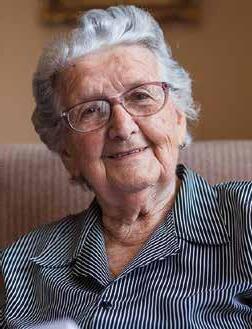
Parklands Care Home
A residential home set in a tranquil location
Tel: 01527 544581
Email: admin@parklandscare.co.uk
Web: www.parklandscare.co.uk
Address: Parklands Care Home, Callow Hill Lane, Callow Hill, Redditch B97 5PU
Redditch care homes continued
Brambles Residential Care Home
Birchfield Road, Redditch B97 4LX
Tel: 01527 555800
Haversham House
OP D PD SI YA
327 Bromsgrove Road, Redditch B97 4NH
Tel: 0121 720 6999 LDA YA
HF Trust – 1 Foxlydiate Mews
Lock Close, Redditch B97 6LQ
Tel: 01527 604820 LDA
Glenfield House Nursing Home
Middle Lane, Kings Norton, Birmingham B38 0DG
Tel: 01564 823795
Southcrest Nursing Home
215 Mount Pleasant, Southcrest, Redditch B97 4JG
Tel: 01527 550720
Worcester care homes
Albion Lodge Retirement Home
OP D PD SI
Parklands Care Home is a residential home on the edge of Redditch, Worcestershire. Set in seven acres of secluded grounds, it boasts views of extensive lawns, woodlands, and the Malvern Hills.
We aim to provide a high standard of care based on individual needs, giving comfort and friendship in a homely and cosy atmosphere. The Home specialises in dementia care and offers those affected with dementia reassurance and support, helping them live well with dementia.
Miles House – 4 Hentland Close
Winyates West, Redditch B98 0LP
OP D PD SI YA
Hanley Swan, Robert End, Worcester WR8 0DN
Tel: 01684 310626 OP YA
Bedwardine House Residential Care Home
Upper Wick Lane, Rushwick, Worcester WR2 5SU
Tel: 01905 425101 OP D PD
Bethany Lodge
222 Malvern Road, Worcester WR2 4PA
Tel: 01905 420088
LDA YA
Parklands
Advertisers are highlighted
Advertisers
Tel: 01527 455705 PD LDA
Callow Hill Lane, Callow Hill, Redditch B97 5PU
Tel: 01527 544581 Advert above OP D PD MH SI
St Martins Care Home Ltd
22 Feckenham Road, Headless Cross, Redditch B97 5AR
Tel: 01527 544592 OP D PD SI
Stonebridge Nursing Home
178-180 Birchfield Road, Headless Cross, Redditch B97 4NA
Tel: 01527 542170 D MH
For more information on paying for residential care in Worcestershire, see page 48.

Broad Group, The – 85 Bath Road
Worcester WR5 3AE
Tel: 01905 360439
Bromyard Road, 95
St Johns, Worcester WR2 5BZ
LDA SI YA
Tel: 01905 429527 OP MH YA
Constable House
6-8 Howard Road, Dines Green, Worcester WR2 5RB
Tel: 01905 422150 OP PD LDA MH SI YA


Individualised Care in a Non-institutionalised setting. Set in an area of outstanding natural beauty. Recently extended to provide 18 new bedrooms each with en-suite shower facilities Do ring if you are thinking of a care home for yourself or a loved one. Facilities

Phone point in own room/mobile
• Smoking not permitted
• Television point in own room
Wheelchair access
“Thank you so much to all the staff at Severn Heights who have been involved to date with my mother’s transfer to the home and for welcoming us too!”

www.carechoices.co.uk
With so many providers to choose from, where do you start?
• Find care providers quickly and easily

• Search by location and care need
• Information on care quality
• Links to inspection reports
• Additional information, photos and web links
• Brochure requests
Firs Rest Home, The
141 Malvern Road, St Johns, Worcester WR2 4LN
Tel: 01905 426194 OP D PD MH SI
Juniper House Residential Care Home
2 Oak View Way, St Johns, Worcester WR2 5FJ
Tel: 01905 676950 OP D PD YA
Northwick Grange
19 Old Northwick Lane, Worcester WR3 7NB
Tel: 01905 453916 OP D PD
Options Bredon House
Hospital Lane, Powick, Worcester WR2 4SQ
Tel: 01905 830234 LDA YA
Phoenix House
122 Bromyard Road, St Johns, Worcester WR2 5DJ
Tel: 01905 426190 LDA
Regent Residential Care Home
School Road, St Johns, Worcester WR2 4HF
Tel: 01905 337100 OP D PD LDA SI YA
Ablegrange Severn Heights Ltd
Old Hills, Callow End, Worcester WR2 4TQ
Tel: 01905 831199 Advert page 64
Fernhill House
Grange Lane, Fernhill Heath WR3 7UR
Tel: 01905 679300 OP D
Henwick Grange
68 Hallow Road, St Johns, Worcester WR2 6BY
Tel: 01905 424705 OP D PD YA
Inspire Neurocare Worcester
195 Oldbury Road, Worcester WR2 6AS
Tel: 01905 969000 D YA
Latimer Court
Darwin Avenue, Worcester WR5 1SP
Tel: 01905 401 630 Advert page 44 OP D PD SI YA
Lawns Nursing Home, The
33 Main Road, Kempsey, Worcester WR5 3NF
Tel: 01905 821388 OP D SI YA
South Hayes Care Home
101 London Road, Worcester WR5 2DZ
Tel: 01905 357429 OP
St Stephen’s Care Home
St Stephens Terrace, Droitwich Road, Worcester WR3 7HU
Tel: 01905 29224 OP D YA
Teme Court Residential Care
Old Road, Lower Wick, Worcester WR2 4BU
Tel: 01905 972023 OP D PD
Willows Care Home, The 2 Tower Road, Barbourne, Worcester WR3 7AF Tel: 01905 20658 OP D PD SI
Woodbury View
Martley Road, Worcester WR2 6QG
Tel: 01905 641745
Advertisers are highlighted
Norton Hall
Woodbury Park, Norton, Worcester WR5 2QU
Tel: 01905 357766 OP D PD
Perry Manor
Charles Hastings Way, Worcester WR5 1ET
Tel: 01905 728410 OP D PD SI
Shaw Red Hill Care Centre
229 London Road, Red Hill, Worcester WR5 2JG
Tel: 01905 354000 OP D PD YA
Stanfield Nursing Home Ltd
Upper Wick Lane, Rushwick, Worcester WR2 5SU
Tel: 01905 420459 OP D PD
Woodland View Care Home
Woodland View, Woodland Way, Droitwich WR9 7GP
Tel: 01905 917358 Advert page 42 OP
Yew Tree Nursing Home
Yew Tree Place, Romsley, Halesowen B62 0NX
Tel: 01562 710809 OP D PD YA
At Richmond Villages Wood Norton you can expect a safe and welcoming environment, where we encourage independence while offering a helping hand. We get to know you, offer a range of sociable activities, and most of all, a place to call home.

Whether you’re looking for long-term nursing or dementia care, respite or post operation / illness recovery, we are here to support you or your loved one with personalised care in a warm and friendly environment.
“After several years of being cared for in her own home, Mum came to Wood Norton very much against her will. However, the kind caring and professional care she receives has won her over. Nothing is too much trouble for the lovely staff... I am kept up to date on her welfare and knowing she is so cared for has given me peace of mind. Mum is happy and content and now calls Wood Norton her home.”
Daughter of resident at Richmond Villages Wood Norton, June 2022
Source: carehome.co.uk
Personal care and medical needs
Nursing and residential, elderly frail and dementia care
Covid Safe
Freshly prepared homemade meals
A choice of private en-suite bedrooms

A variety of daily activities and access to the wellness spa
Beautiful interiors, landscaped gardens and woodland

Abbey House – Evesham
7 St Wulstans Close, Evesham WR11 2GB
Tel: 01386 401401 LDA
Ash Grove
56 Ash Grove, Evesham WR11 1XN
Tel: 01789 298709 LDA
Briarlea Care Home
Badsey Road, Evesham WR11 7PA
Tel: 01386 830214 OP D
Brooklands
92 Northwick Road, Evesham WR11 3AL
Tel: 01386 423178 PD LDA
Cedar Lodge Care Home
Main Street, Offenham, Evesham WR11 8RL
Tel: 01386 446871 OP D PD SI
Cheltenham Road
Evesham WR11 2LQ
Tel: 01386 442783 PD LDA MH SI YA
Corran Dean at Smokey Farm
Smokey Lane, Cropthorne, Pershore WR10 3NF
Tel: 01386 860231 LDA MH YA
Droitwich Mews Care Home
Mulberry Tree Hill, Droitwich WR9 7SS
Tel: 01905 934183 Advert page 46 OP D PD SI YA
Gloucester House – Learning Disability and Autism
21 Cheltenham Road, Evesham WR11 1LA
Tel: 01386 761658 PD LDA MH SI YA
Greenhill Park Residential Care Home
24 Greenhill Park Road, Evesham WR11 4NL
Tel: 01386 408360 OP D
Haven Rest Home, The 218 Worcester Road, Droitwich WR9 8AY
Tel: 01905 772240 OP D
Heathlands Residential Care Home Station Road, Pershore WR10 1NG
Tel: 01386 562220 OP D PD SI YA
HF Trust – 1 & 2 Clementi Court Houses Off 8 Glencoe Road, Bengeworth, Evesham WR11 3QZ
Tel: 01386 48547 LDA
Lime Street, 21 – Learning Disability and Autism
Evesham WR11 3AW
Tel: 01386 422017
Mill House Care Home, The Kington, Flyford Flavell WR7 4DG
PD LDA MH SI YA
Tel: 01386 793110 OP D PD
Newland Hurst
Newland Lane, Newland, Droitwich Spa, Droitwich WR9 7JH
Tel: 01905 773156 OP LDA YA
Pershore Short Term Breaks
48 Station Road, Pershore WR10 1PD
Tel: 01386 552978
Priory Care Home, The Crutch Lane, Dodderhill, Droitwich WR9 0BE
Tel: 01905 771595
Safeharbour (Droitwich)
52 Corbett Avenue, Droitwich WR9 7BH
Tel: 01905 796214
Stonebow House Residential Home
LDA SI
OP D PD
Worcester Road, Peopleton, Pershore WR10 2DY
LDA
Tel: 01905 840245 OP
Upper Ford Lodge
Ford Lane, Droitwich WR9 0BQ
Tel: 01905 779949
Westmead Residential Care Home
Westmead Close, Westacre, Droitwich WR9 9LG
LDA
Tel: 01905 778353 OP D PD SI YA
Willow Bank Residential Home
Tilesford Park, Throckmorton, Pershore WR10 2LA
Tel: 01386 556844 OP D PD YA
Austen Court Care Home
Davies Road, Evesham WR11 2LE
Tel: 01386 306570
Bricklehampton Hall
Bricklehampton, Pershore WR10 3HQ
Tel: 01386 710573
Brindley Manor Nursing Home
St Peters Walk, Droitwich WR9 8EX
Tel: 01905 794506
Brompton House Care Home
Station Road, Broadway WR12 7DE
Tel: 01386 853473
Cavendish Park
Offenham Road, Evesham WR11 3DX
Tel: 01386 210010
Corbett House Nursing Home
40-42 Corbett Avenue, Droitwich WR9 7BE
Tel: 01905 770572
Arden House
11 Roden Avenue, Kidderminster DY10 2RF
Tel: 01562 744056 OP D PD LDA MH SI YA
Areley House
Areley Lane, Stourport-on-Severn DY13 0AB
Tel: 01299 877727 OP D
Breach House
Holy Cross Lane, Belbroughton, Stourbridge DY9 9SP
Tel: 01562 730021 OP D
Brinton Care Home
103-104 Stourport Road, Kidderminster DY11 7BQ
Tel: 01562 825491 LDA
Bryden House
Marlpool Lane, Kidderminster DY11 5DA
Tel: 01562 755888 OP D PD
Cambrian House
294 Chester Road North, Kidderminster DY10 2RR
Tel: 01562 825537 OP D PD YA
Dorset House
Blackfriars Avenue, Droitwich WR9 8DR
Tel: 01905 772710 OP
Hawthorns (Evesham), The Church Street, Evesham WR11 1EP
Tel: 01386 444330 OP D PD
Pirton Grange Specialist Services
Worcester Road, Pirton, Worcester WR8 9EF
Tel: 01905 821544 OP D PD LDA MH SI YA AD
Rashwood
Wychbold, Droitwich WR9 0BP
Tel: 01527 861258 OP PD
Richmond Village Wood Norton
Evesham Road, Wood Norton, Evesham WR11 4TY
Tel: 01386 366059 Advert page 66 OP D YA
For information on different types of care home, see page 43.
Casa Mia Care Home
Cleobury Road, Far Forest, Kidderminster DY14 9EH
Tel: 01299 266317 OP D PD MH SI YA AD
Chandos Lodge
77 Stourbridge Road, Hagley, Stourbridge DY9 0QS
Tel: 01562 885858 OP D PD
Coppice Lodge
66-68 Walter Nash Road, Kidderminster DY11 7BY
Tel: 01562 637665 OP LDA MH YA
Dunley Hall and Ryans Court
Dunley, Stourport-on-Severn DY13 0TX
Tel: 01299 822040 OP D PD MH SI YA AD
Fairmont Residential Ltd
144 Chester Road South, Kidderminster DY10 1XB
Tel: 01562 634324 LDA
Ferndale Close, 3
3 Ferndale Close, Hagley, Stourbridge DY9 0QA
Tel: 07980 145915 LDA YA
Field House Rest Home
Thicknall Lane, off Western Road, Hagley, Clent, Stourbridge DY9 0HL
Tel: 01562 885211
Firs Care Home, The

105 Habberley Road, Kidderminster DY11 5PW
Tel: 01562 741358
Foley Grange
Silverwoods Way, Kidderminster DY11 7DT
Tel: 01562 543366
Gables Rest Home, The
18 Broomfield Road, Kidderminster DY11 5PB
Tel: 01562 745428
Grange Hill House Residential Home
516 Bromsgrove Road, Hunnington, Halesowen B62 0JJ
Tel: 0121 550 1312
Grove, The
8 Blakebrook, Kidderminster DY11 6AP
Tel: 01562 820728
Hernes Nest House
Herne’s Nest, off Park Lane, Bewdley DY12 2ET
Tel: 01299 402136
Honeybrook House
Honeybrook Lane, Kidderminster DY11 5QS
Tel: 01562 748109 LDA
Lorne House
14 Lorne Street, Kidderminster DY10 1SY
Tel: 01562 630522
Malvern View
573 Birmingham Road, Lydiate Ash, Bromsgrove B61 0HX
Tel: 0121 453 7727 OP D PD LDA MH SI YA
Maple Leaf Lodge
Icknield Street, Forhill, Birmingham B38 9EG
Tel: 01564 824594
OP D PD LDA MH SI YA
Mariantonia House Residential Care Home
17 Comberton Road, Kidderminster DY10 1UA
Tel: 01562 694450 D LDA MH
Milldale Close
3 Milldale Close, Kidderminster DY10 2PX
Tel: 01562 63424 LDA
Minster Grange Residential Home
Minster Road, Stourport-on-Severn DY13 8AT
Tel: 01299 826636 OP D PD MH SI YA AD
Nightingale Court
11-14 Comberton Road, Kidderminster DY10 1UA

Tel: 01562 824980 Advert below OP D
Nightingales Residential Home
Wolverley Court, Wolverley Road, Kidderminster DY10 3RP Tel: 01562 850201 OP PD SI
Offmore Farm Residential Home Offmore Farm Close, Kidderminster DY10 3HB Tel: 01562 515189 OP D PD

Poppies Residential Care Home, The 17 Birmingham Road, Kidderminster DY10 2BX Tel: 01562 743233 OP PD MH SI YA
At Nightingale Court we believe a sense of freedom is important and we encourage free movement around the Home. All sorts of objects which people with dementia find meaningful are provided. We encourage expression of feelings and promote Service Users doing ordinary everyday things.
Spacious bedrooms at Nightingale Court are all fully furnished and aesthetically designed to a high standard. All rooms have television points, nurse call alarms and smoke detectors. Our new extension offers luxury single rooms with en-suite facilities and separate lounge area that leads onto an attractive courtyard.
11-14 Comberton Road, Kidderminster, Worcestershire, DY10 1UA
Telephone: 01562 824 980 • Web: www.curagroup.co.uk/nightingale-court
“Warm, friendly and professional care homes”

Herons Park Nursing Home is located in quiet parkland in Kidderminster, and has been part of our care group since 2006.

With a focus on the individual, Herons Park provides its residents with a comfortable and safe living environment coupled with dedicated professional nursing care. All e orts are made to ensure that residents experience a good quality of life, and our Registered Manager and quali ed care sta are always on hand to o er any support and advice you need.

Ravenhurst Residential Care Home
21 Lickhill Road North, Stourport-on-Severn DY13 8RU
Tel: 01299 825610
Rockny House
OP D PD SI YA
25 Birmingham Road, Kidderminster DY10 2BX
Tel: 01562 864067
Rosedene
OP D PD LDA MH YA
128 Franche Road, Kidderminster DY11 5BE
Tel: 01562 861917 LDA MH
Rutland Villa
62 Chesshire Avenue, Stourport-on-Severn DY13 0EA Tel: 01299 879221 LDA
Wyre Forest care homes with nursing
Astley Hall Nursing Home
Church Lane, Astley, Stourport-on-Severn DY13 0RW
Tel: 01299 827020 OP D PD MH SI YA
Brook Court
37-39 Oldnall Road, Kidderminster DY10 3HN
Tel: 0333 321 0920 OP D PD LDA MH YA
Brookdale Nursing Home
16 Blakebrook, Kidderminster DY11 6AP
Tel: 01562 823063 OP D PD YA
Bryden House
Marlpool Lane, Kidderminster DY11 5DA
Tel: 01562 755888 OP D PD
Coach House Nursing Home
Broome, Clent, Stourbridge DY9 0HB
Tel: 01562 700417 OP PD YA
Coombe House
54 Broomfield Road, Kidderminster DY11 5PH
Tel: 01562 824770 LDA
Foresters Nursing Home
Walton Pool, Clent, Stourbridge DY9 9RP
Tel: 01562 883068 OP D PD
Shenstone House
Shenstone, Kidderminster DY10 4DH
Tel: 01562 777454 OP D PD SI YA
Summerleigh
Clent Grove, Clent, Stourbridge DY9 9PB
Tel: 07526 173666 LDA
Three Roses Home
Bromsgrove Road, Holy Cross, Clent, Stourbridge DY9 9QP
Tel: 01562 730730 LDA
Worth Crescent
35 Worth Crescent, Stourport-on-Severn DY13 8RR
Tel: 01299 822515 LDA
Advertisers are highlighted
Herons Park Nursing Home
Heronswood Road, Spennells, Kidderminster DY10 4EX
Tel: 01562 825814 Advert page 70 OP D PD YA
Hollyfields
Habberley Road, Habberley, Kidderminster DY11 5RJ
Tel: 01562 569 884 Advert page 44 OP D YA
Holmwood Care Centre
30 Chaddesley Road, Kidderminster DY10 3DJ
Tel: 01562 824496 OP PD YA
Shrubbery Nursing Home, The Birmingham Road, Kidderminster DY10 2JZ
Tel: 01562 822787 OP D PD SI
Summerdyne Nursing Home
Cleobury Road, Bewdley DY12 2QQ
Tel: 01299 403260 OP D
Westley Court Care Home
Austcliffe Lane, Cookley, Kidderminster DY10 3RT Advert outside back cover
Tel: 01793 821200 OP D PD YA
Wharf Care Centre, The
76 Minster Road, Stourport-on-Severn DY13 8AP
Tel: 01299 879056 OP D PD MH SI YA
Action Deafness
Vesta Tilley House, Lowesmoor, Worcester WR1 2RS
Aims to promote independence and equality of opportunity for deaf and hard of hearing people living in the communities of Herefordshire, Oxfordshire and Worcestershire.
Tel: 0116 253 3200
Email: enquiries@actiondeafness.org.uk
Web: www.actiondeafness.org.uk
Age UK
Working for all older people in Worcestershire.
Bromsgrove, Redditch and Wyre Forest
Tel: 01527 570490
Herefordshire and Worcestershire
Tel: 0800 008 6077 (freephone).
Worcester and Malvern Hills
Tel: 01905 724294 (Worcester office) and 01684 560666 (Malvern office).
Alzheimer’s Society – Dementia Support
Worcestershire
Tel: 01905 621868
Email: worcestershire@alzheimers.org.uk
Barrie Bookkeeping and Payroll Solutions
Provides the Direct Payment Support Service in Worcestershire.
Tel: 01902 912896
Email DP@barriebookkeeping.co.uk
Web: www.barriebookkeeping.co.uk
British Red Cross Centre – Worcester
Bradbury Court, Unit 8, Berkeley Business Park, Wainwright Road WR4 9GY
Tel: 0344 871 8000
Community Transport
Operated by not-for-profit organisations throughout Worcestershire, providing journeys to a variety of locations for those who cannot use local bus services or for whom no alternative transport is available. Journeys can be offered in minibuses, accessible cars and volunteers’ own vehicles and
all drivers and assistants are DBS checked and registered with their local scheme. Trips can be provided to hospitals, GP surgeries, shops, opticians, dentists, day centres, clubs, the library etc. and a fare is payable. Contact in advance as operating times may vary.
Web: www.communitytravel.org.uk
Alfrick and Lulsley Community Car Scheme
Tel: 01886 884234
Bluewave Community Transport
Tel: 01527 759650
Broadwas and Knightwick Community Car Scheme
Tel: 01905 333288
Bromsgrove Rural Rides • Tel: 01299 405832
Bromsgrove Urban and Rural Transport (BURT)
Tel: 01527 585893
Community Action Malvern and District
Tel: 01684 892381
Community Transport Wyre Forest
Tel: 01299 405832
Droitwich Spa and Rural CVS • Tel: 01905 779778
Evesham Community Car Scheme
Tel: 01386 45035
Leigh and Bransford Scheme • Tel: 01886 832990
Malvern Dial-a-Ride • Tel: 01684 891121
Pershore Volunteer Centre • Tel: 01386 554299
Redditch Car Scheme • Tel: 01299 405832
Redditch Dial-a-Ride • Tel: 01527 534191
Suckley Community Car Scheme
Tel: 01886 884221
Tenbury Transport Trust • Tel: 01584 810491
Upton Community Care (Car Scheme)
Tel: 01684 593633
Upton Shuttle • Tel: 01684 892381
Worcester Wheels • Tel: 01905 450654
Wyre Forest Dial-a-Ride • Tel: 01562 755084
Wythall Dial-a-Ride • Tel: 0121 453 9682
Disability Information Line (DIAL)
An independent charity providing information and advice services to disabled people and others on all aspects of living with a disability.
North Worcestershire
Tel: 01562 60241
Email: info@dialinworcestershire.org.uk
Web: www.nwdial.org.uk
South Worcestershire
Tel: 01905 27790 • Email: mail@dialsworcs.org.uk
Web: www.dialsworcs.org.uk
Headway Worcestershire
Provides information, activities, support and services to people with brain injuries, their families and carers.
Tel: 01905 729729
Email: enquiries@hwtl.org.uk
Web: www.headwayworcestershire.org.uk
Healthwatch Worcestershire
Independent champion for people using health and social care services. Healthwatch Worcestershire is here to listen to people’s experiences of publicly funded health and social care services, help improve
the quality of services by letting those running them know what people want and to help people find out about local health and social care services.
Tel: 01386 550264
Email: info@healthwatchworcestershire.co.uk
Web: www.healthwatchworcestershire.co.uk
Onside Advocacy
Providing practical and proactive support to ensure fairness and equality for adults who may be vulnerable or disadvantaged.
Tel: 01905 27525
Email: info@onside-advocacy.org.uk
Web: www.onside-advocacy.org.uk
Sight Concern – Worcestershire
An independent charity that supports blind and partially sighted people throughout Worcestershire.
Tel: 01905 723245
Email: info@sightconcern.co.uk
Web: www.sightconcern.co.uk
Worcestershire Association of Carers
A new countywide information, advice and support service for carers.
Tel: 0300 012 4272 • Web: www.carersworcs.org.uk
Worcestershire Directorate of Adult Services and Health
Worcestershire County Council, County Hall, Spetchley Road, Worcester WR5 2NP
Tel: 01905 768053
Email: adultteam@worcestershire.gov.uk
Web: www.worcestershire.gov.uk
Al-Anon Family Groups
Worried about someone’s drinking? Help and hope for families and friends of alcoholics.
Helpline: 0800 008 6811 (10.00am to 10.00pm).
Email: helpline@al-anonuk.org.uk
Web: www.al-anonuk.org.uk
AskSARA
Part of the Disabled Living Foundation, AskSARA is an easy-to-use, award-winning online self-help guide that is particularly useful if you are not sure
what practical items might help you.
Web: https://asksara.livingmadeeasy.org.uk
Age UK
Inspires, supports and enables older people.
Tel: 0800 055 6112 • Web: www.ageuk.org.uk
Association of Charitable Organisations
A national umbrella body for benevolent charities.
Tel: 0207 255 4480 • Email: info@aco.uk.net
Web: www.aco.uk.net
Publisher of this Directory, Care Choices has a website providing comprehensive details of care providers as well as essential information.
Web: www.carechoices.co.uk
Carers UK
Advice and information to carers and the professionals who support them.
Tel: 0808 808 7777
Email: advice@carersuk.org
Web: www.carersuk.org
Citizens Advice
Tel: 0800 144 8848
Web: www.citizensadvice.org.uk
Dementia Adventure
Provides supported holidays for people with dementia as an alternative to traditional respite where partners, family, friends or carers can enjoy an outdoor break together. Holidays are usually five days long, can be bespoke, are subsidised and are available to anyone across the UK.
Tel: 01245 237548
Email: info@dementiaadventure.co.uk
Web: www.dementiaadventure.co.uk
Elderly Accommodation Counsel (EAC) FirstStop
Helps older people make informed choices about meeting their housing and care needs.
Tel: 0800 377 7070
Email: info@firststopcareadvice.org.uk
Web: www.firststopcareadvice.org.uk
Friends of the Elderly
A charity that supports older people who have a range of practical needs.
Tel: 0207 730 8263
Email: enquiries@fote.org.uk
Web: www.fote.org.uk
Homecare Association
Professional association of home care providers from the independent, voluntary, not-for-profit and statutory sectors.
Tel: 0208 661 8188
Email: helpline@homecareassociation.org.uk
Web: www.homecareassociation.org.uk
Hourglass
Works to protect and prevent the abuse of vulnerable older adults.
Helpline: 0808 808 8141
Web: www.wearehourglass.org
Independent Age
A national charity that champions independence for older people by providing lifelong support, information and advice, practical help and emergency financial aid to older people on very low incomes.
Tel: 0800 319 6789
Email: advice@independentage.org
Web: www.independentage.org
Living made easy
A national charity providing impartial advice, information and training on independent living. There are also helpful factsheets on the website below.
Tel: 0300 999 0004
Email: info@dlf.org.uk
Web: www.livingmadeeasy.org.uk
Money Helper – pensions guidance
Provides information about pensions and other pensioner benefits.
Tel: 0800 011 3797
Web: www.moneyhelper.org.uk/en/pensions-andretirement
My Family, Our Needs
The lifestyle site for families, carers and practitioners supporting children and young adults with additional needs.
Web: www.myfamilyourneeds.co.uk
National Activity Providers Association
Promotes the importance of activities for older people.
Tel: 01494 590421
Email: info@napa-activities.co.uk
Web: https://napa-activities.co.uk
The NHS is the UK’s biggest health website and provides information on conditions, treatments, local services and healthy living.
Web: www.nhs.uk
A music and dementia charity based in Glasgow and covering the whole of the United Kingdom. Its aim is to ensure everyone living with dementia has access to a personalised playlist and for everyone who cares for them to know how to use it. The charity offers free advice and resources to anyone affected by dementia who could benefit from the power of music. It also provides training for health and social care professionals looking to deliver person-centred care using personalised music.
Tel: 0141 404 0683
Email: info@playlistforlife.org.uk
Web: www.playlistforlife.org.uk
Relatives & Residents Association
Exists for older people needing, or living in, residential care and their families and friends.
Tel: 0207 359 8136
Email: helpline@relres.org
Web: www.relres.org
Veterans’ Gateway
The first point of contact for Armed Forces personnel, veterans and their families seeking information about employability, finances, personal relationships, befriending and more.
Tel: 0808 802 1212
Web: www.veteransgateway.org.uk
Care Choices Limited has taken every care to ensure that the information contained in this Directory is accurate at the time of print. The company cannot accept responsibility for any errors or omissions in the publication, including if an organisation varies from the information included in an advertisement, the editorial or the listings. Care Choices Limited does not endorse or support any particular organisation included in the Directory. ©2022 Care Choices Limited. Care Choices Limited reserves all rights in the titles Care Choices and HOMES Directories and their design. Care Choices™ is a trademark of Care Choices Limited.
Ref. No: 4001/Worcestershire16/1222. Reproduction of any part of this publication in any form without the written permission of Care Choices Limited is prohibited. This publication is available free of charge from Worcestershire County Council.
Published by: Care Choices Limited, Valley Court, Lower Road, Croydon, Nr Royston, Hertfordshire SG8 0HF. Tel: 01223 207770.
Director of Policy and Communications: Jo Dovey.
Director of Sales: David Werthmann.
Editors: Olivia Hubbard, Angharad Burnham.
Lead Editor: Henry Thornton.
Content Editor: Aislinn Thompson.
Sales Manager: Paul O’Callaghan.
Regional Sales Supervisor: Vanessa Ryder.
Senior Sales Executives: Tony Boyce, Hannah O’Neill, Susan Speaight.
Sales Executives: Jaimie Modi.
Director of Creative Operations: Lisa Werthmann.
Studio Manager: Jamie Harvey.
Lead Designer: Ruth Keating.
Rebecca Mendil, Patrycja Radzka, Tyler Smith.
Westley Court is a charming, refurbished nursing home located in the peaceful village of Cookley. Our experienced nurses and carers pride themselves on making our residents feel really ‘at home’ in 33 tastefully decorated rooms, all with en-suite facilities.
Westley Court is owned by family-run care providers, Coate Water Care, National Care Association Member of the Year 2019 Specialists in residential and bespoke nursing care for people living with dementia, as well as respite care and palliative care










Highly professional care setting with experienced carers and support sta







We’d love to show you around our luxury care home and talk about bespoke care for your loved ones. Call 01793 821200 www.coatewatercare.co.uk







